Enhancing Employability Skills for Success in the Hospitality Industry
VerifiedAdded on 2023/02/02
|17
|5701
|26
AI Summary
This report focuses on the importance of employability skills in the growth and success of a business, specifically in the context of Travelodge Hotels Limited. It discusses the development of responsibilities and performance objectives, evaluation of self-effectiveness, recommendations for improvement, and motivational techniques for enhancing quality performance. The report also highlights the significance of effective communication and offers solutions to work-based issues. Overall, it provides valuable insights into enhancing employability skills in the hospitality industry.
Contribute Materials
Your contribution can guide someone’s learning journey. Share your
documents today.
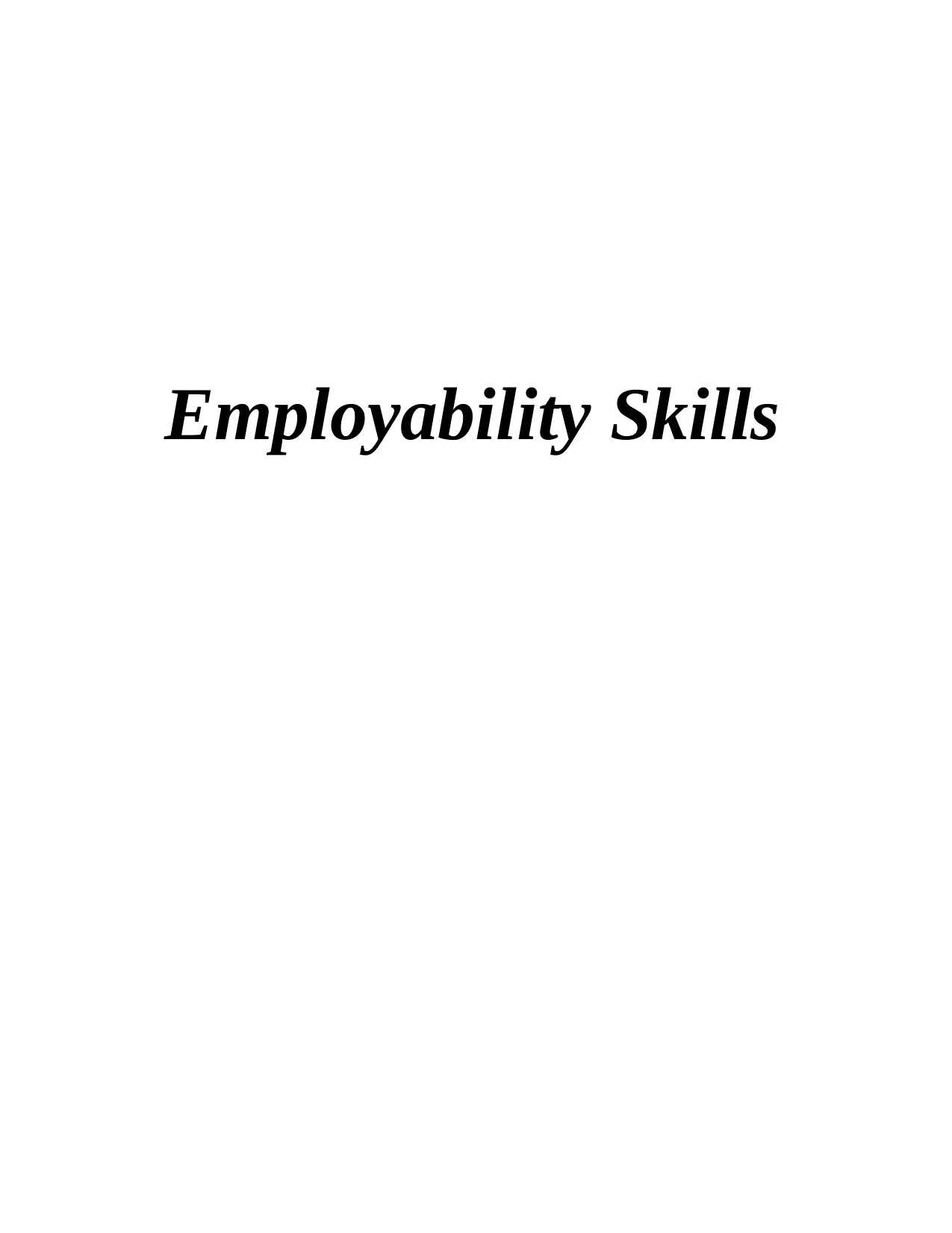
Employability Skills
Secure Best Marks with AI Grader
Need help grading? Try our AI Grader for instant feedback on your assignments.
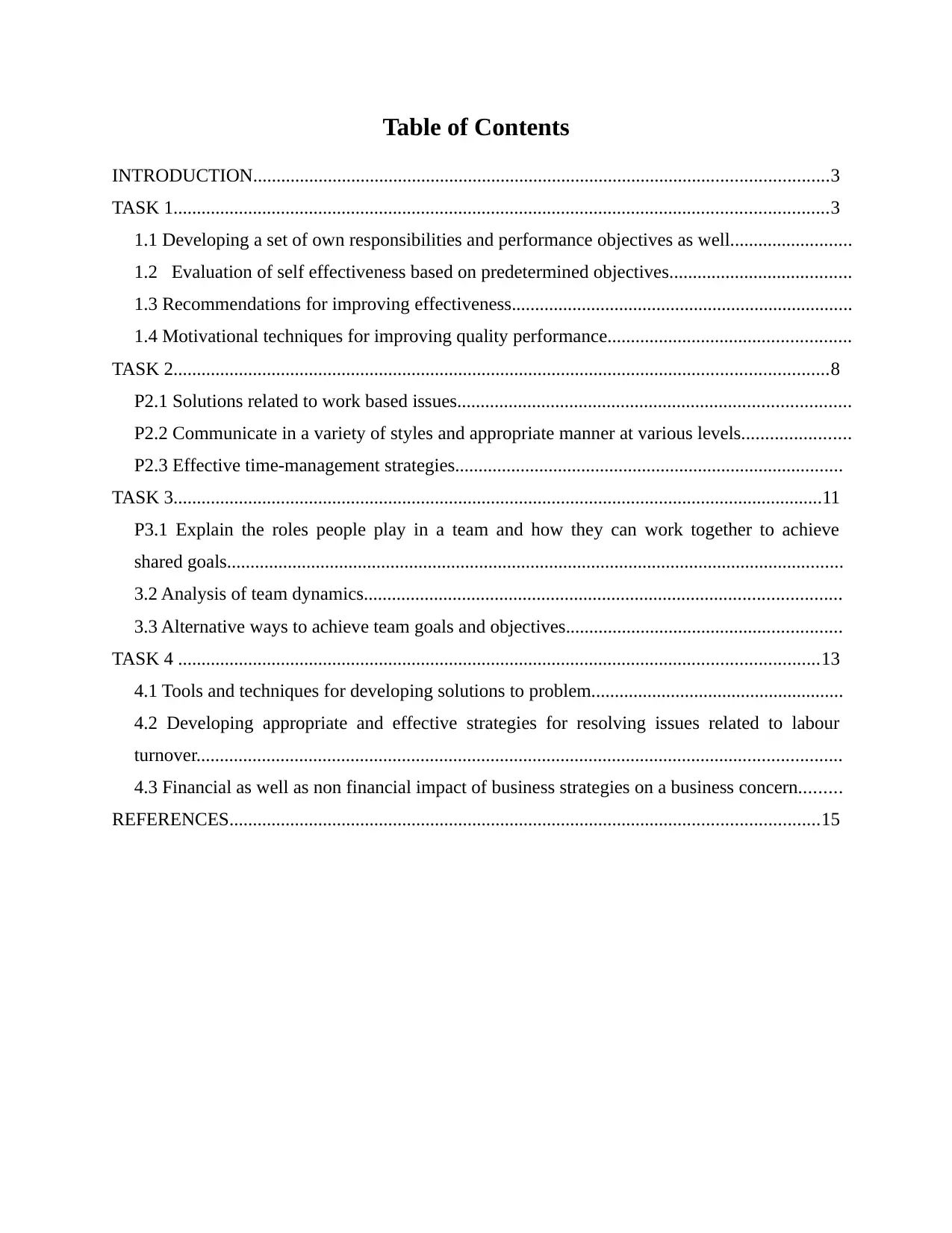
Table of Contents
INTRODUCTION...........................................................................................................................3
TASK 1............................................................................................................................................3
1.1 Developing a set of own responsibilities and performance objectives as well..........................
1.2 Evaluation of self effectiveness based on predetermined objectives.......................................
1.3 Recommendations for improving effectiveness.........................................................................
1.4 Motivational techniques for improving quality performance....................................................
TASK 2............................................................................................................................................8
P2.1 Solutions related to work based issues....................................................................................
P2.2 Communicate in a variety of styles and appropriate manner at various levels.......................
P2.3 Effective time-management strategies...................................................................................
TASK 3...........................................................................................................................................11
P3.1 Explain the roles people play in a team and how they can work together to achieve
shared goals....................................................................................................................................
3.2 Analysis of team dynamics......................................................................................................
3.3 Alternative ways to achieve team goals and objectives...........................................................
TASK 4 .........................................................................................................................................13
4.1 Tools and techniques for developing solutions to problem......................................................
4.2 Developing appropriate and effective strategies for resolving issues related to labour
turnover..........................................................................................................................................
4.3 Financial as well as non financial impact of business strategies on a business concern.........
REFERENCES..............................................................................................................................15
INTRODUCTION...........................................................................................................................3
TASK 1............................................................................................................................................3
1.1 Developing a set of own responsibilities and performance objectives as well..........................
1.2 Evaluation of self effectiveness based on predetermined objectives.......................................
1.3 Recommendations for improving effectiveness.........................................................................
1.4 Motivational techniques for improving quality performance....................................................
TASK 2............................................................................................................................................8
P2.1 Solutions related to work based issues....................................................................................
P2.2 Communicate in a variety of styles and appropriate manner at various levels.......................
P2.3 Effective time-management strategies...................................................................................
TASK 3...........................................................................................................................................11
P3.1 Explain the roles people play in a team and how they can work together to achieve
shared goals....................................................................................................................................
3.2 Analysis of team dynamics......................................................................................................
3.3 Alternative ways to achieve team goals and objectives...........................................................
TASK 4 .........................................................................................................................................13
4.1 Tools and techniques for developing solutions to problem......................................................
4.2 Developing appropriate and effective strategies for resolving issues related to labour
turnover..........................................................................................................................................
4.3 Financial as well as non financial impact of business strategies on a business concern.........
REFERENCES..............................................................................................................................15
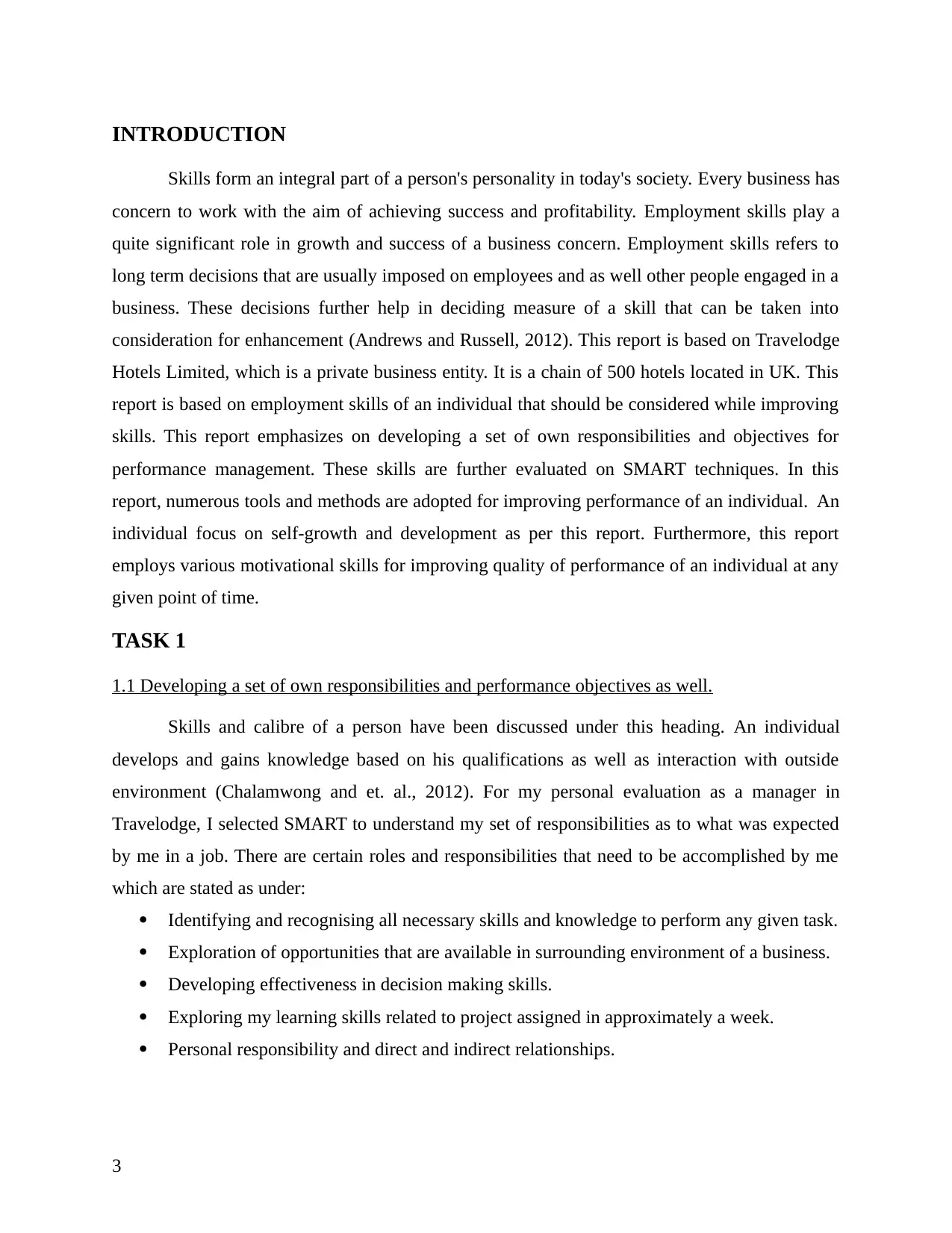
INTRODUCTION
Skills form an integral part of a person's personality in today's society. Every business has
concern to work with the aim of achieving success and profitability. Employment skills play a
quite significant role in growth and success of a business concern. Employment skills refers to
long term decisions that are usually imposed on employees and as well other people engaged in a
business. These decisions further help in deciding measure of a skill that can be taken into
consideration for enhancement (Andrews and Russell, 2012). This report is based on Travelodge
Hotels Limited, which is a private business entity. It is a chain of 500 hotels located in UK. This
report is based on employment skills of an individual that should be considered while improving
skills. This report emphasizes on developing a set of own responsibilities and objectives for
performance management. These skills are further evaluated on SMART techniques. In this
report, numerous tools and methods are adopted for improving performance of an individual. An
individual focus on self-growth and development as per this report. Furthermore, this report
employs various motivational skills for improving quality of performance of an individual at any
given point of time.
TASK 1
1.1 Developing a set of own responsibilities and performance objectives as well.
Skills and calibre of a person have been discussed under this heading. An individual
develops and gains knowledge based on his qualifications as well as interaction with outside
environment (Chalamwong and et. al., 2012). For my personal evaluation as a manager in
Travelodge, I selected SMART to understand my set of responsibilities as to what was expected
by me in a job. There are certain roles and responsibilities that need to be accomplished by me
which are stated as under:
Identifying and recognising all necessary skills and knowledge to perform any given task.
Exploration of opportunities that are available in surrounding environment of a business.
Developing effectiveness in decision making skills.
Exploring my learning skills related to project assigned in approximately a week.
Personal responsibility and direct and indirect relationships.
3
Skills form an integral part of a person's personality in today's society. Every business has
concern to work with the aim of achieving success and profitability. Employment skills play a
quite significant role in growth and success of a business concern. Employment skills refers to
long term decisions that are usually imposed on employees and as well other people engaged in a
business. These decisions further help in deciding measure of a skill that can be taken into
consideration for enhancement (Andrews and Russell, 2012). This report is based on Travelodge
Hotels Limited, which is a private business entity. It is a chain of 500 hotels located in UK. This
report is based on employment skills of an individual that should be considered while improving
skills. This report emphasizes on developing a set of own responsibilities and objectives for
performance management. These skills are further evaluated on SMART techniques. In this
report, numerous tools and methods are adopted for improving performance of an individual. An
individual focus on self-growth and development as per this report. Furthermore, this report
employs various motivational skills for improving quality of performance of an individual at any
given point of time.
TASK 1
1.1 Developing a set of own responsibilities and performance objectives as well.
Skills and calibre of a person have been discussed under this heading. An individual
develops and gains knowledge based on his qualifications as well as interaction with outside
environment (Chalamwong and et. al., 2012). For my personal evaluation as a manager in
Travelodge, I selected SMART to understand my set of responsibilities as to what was expected
by me in a job. There are certain roles and responsibilities that need to be accomplished by me
which are stated as under:
Identifying and recognising all necessary skills and knowledge to perform any given task.
Exploration of opportunities that are available in surrounding environment of a business.
Developing effectiveness in decision making skills.
Exploring my learning skills related to project assigned in approximately a week.
Personal responsibility and direct and indirect relationships.
3
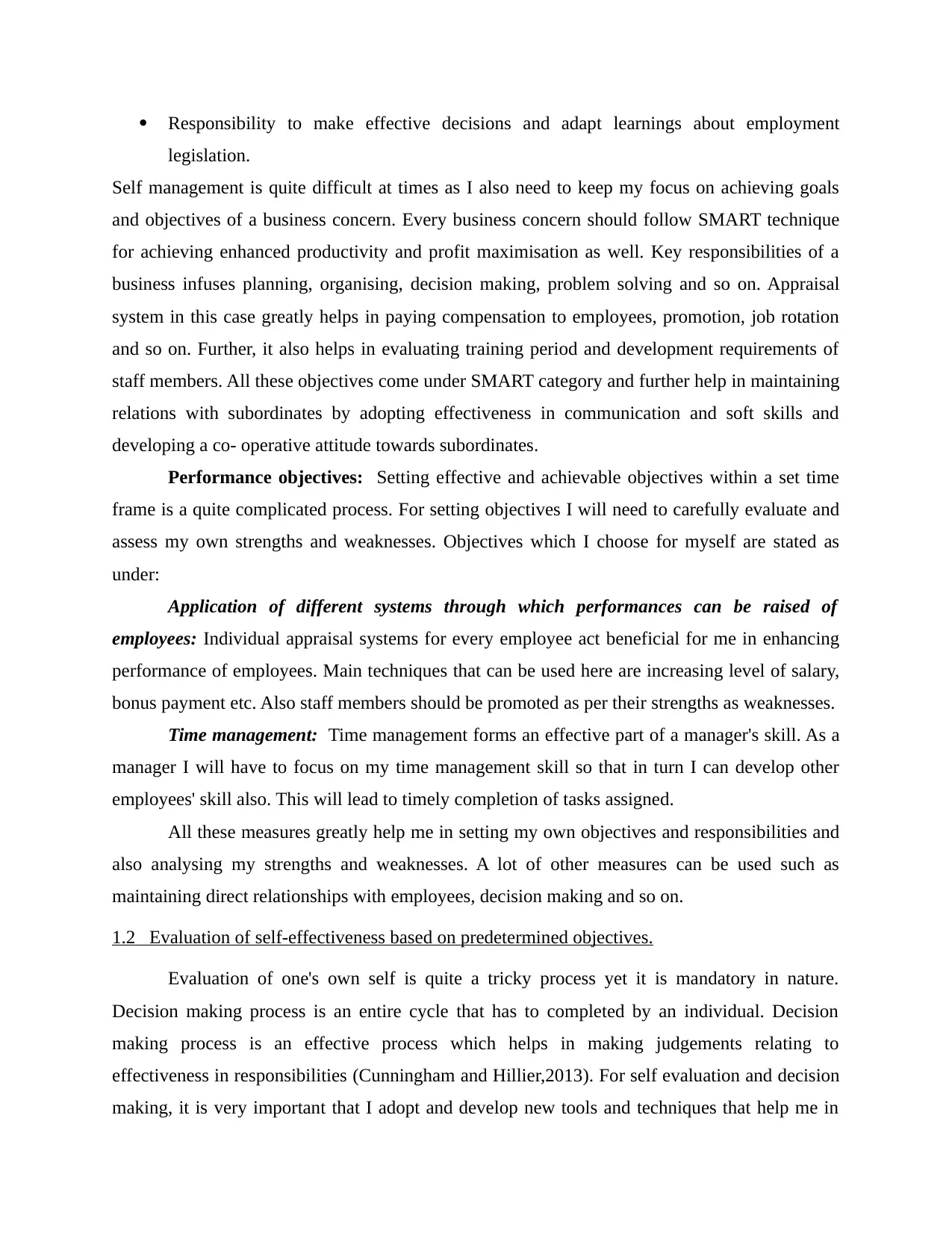
Responsibility to make effective decisions and adapt learnings about employment
legislation.
Self management is quite difficult at times as I also need to keep my focus on achieving goals
and objectives of a business concern. Every business concern should follow SMART technique
for achieving enhanced productivity and profit maximisation as well. Key responsibilities of a
business infuses planning, organising, decision making, problem solving and so on. Appraisal
system in this case greatly helps in paying compensation to employees, promotion, job rotation
and so on. Further, it also helps in evaluating training period and development requirements of
staff members. All these objectives come under SMART category and further help in maintaining
relations with subordinates by adopting effectiveness in communication and soft skills and
developing a co- operative attitude towards subordinates.
Performance objectives: Setting effective and achievable objectives within a set time
frame is a quite complicated process. For setting objectives I will need to carefully evaluate and
assess my own strengths and weaknesses. Objectives which I choose for myself are stated as
under:
Application of different systems through which performances can be raised of
employees: Individual appraisal systems for every employee act beneficial for me in enhancing
performance of employees. Main techniques that can be used here are increasing level of salary,
bonus payment etc. Also staff members should be promoted as per their strengths as weaknesses.
Time management: Time management forms an effective part of a manager's skill. As a
manager I will have to focus on my time management skill so that in turn I can develop other
employees' skill also. This will lead to timely completion of tasks assigned.
All these measures greatly help me in setting my own objectives and responsibilities and
also analysing my strengths and weaknesses. A lot of other measures can be used such as
maintaining direct relationships with employees, decision making and so on.
1.2 Evaluation of self-effectiveness based on predetermined objectives.
Evaluation of one's own self is quite a tricky process yet it is mandatory in nature.
Decision making process is an entire cycle that has to completed by an individual. Decision
making process is an effective process which helps in making judgements relating to
effectiveness in responsibilities (Cunningham and Hillier,2013). For self evaluation and decision
making, it is very important that I adopt and develop new tools and techniques that help me in
legislation.
Self management is quite difficult at times as I also need to keep my focus on achieving goals
and objectives of a business concern. Every business concern should follow SMART technique
for achieving enhanced productivity and profit maximisation as well. Key responsibilities of a
business infuses planning, organising, decision making, problem solving and so on. Appraisal
system in this case greatly helps in paying compensation to employees, promotion, job rotation
and so on. Further, it also helps in evaluating training period and development requirements of
staff members. All these objectives come under SMART category and further help in maintaining
relations with subordinates by adopting effectiveness in communication and soft skills and
developing a co- operative attitude towards subordinates.
Performance objectives: Setting effective and achievable objectives within a set time
frame is a quite complicated process. For setting objectives I will need to carefully evaluate and
assess my own strengths and weaknesses. Objectives which I choose for myself are stated as
under:
Application of different systems through which performances can be raised of
employees: Individual appraisal systems for every employee act beneficial for me in enhancing
performance of employees. Main techniques that can be used here are increasing level of salary,
bonus payment etc. Also staff members should be promoted as per their strengths as weaknesses.
Time management: Time management forms an effective part of a manager's skill. As a
manager I will have to focus on my time management skill so that in turn I can develop other
employees' skill also. This will lead to timely completion of tasks assigned.
All these measures greatly help me in setting my own objectives and responsibilities and
also analysing my strengths and weaknesses. A lot of other measures can be used such as
maintaining direct relationships with employees, decision making and so on.
1.2 Evaluation of self-effectiveness based on predetermined objectives.
Evaluation of one's own self is quite a tricky process yet it is mandatory in nature.
Decision making process is an entire cycle that has to completed by an individual. Decision
making process is an effective process which helps in making judgements relating to
effectiveness in responsibilities (Cunningham and Hillier,2013). For self evaluation and decision
making, it is very important that I adopt and develop new tools and techniques that help me in
Secure Best Marks with AI Grader
Need help grading? Try our AI Grader for instant feedback on your assignments.
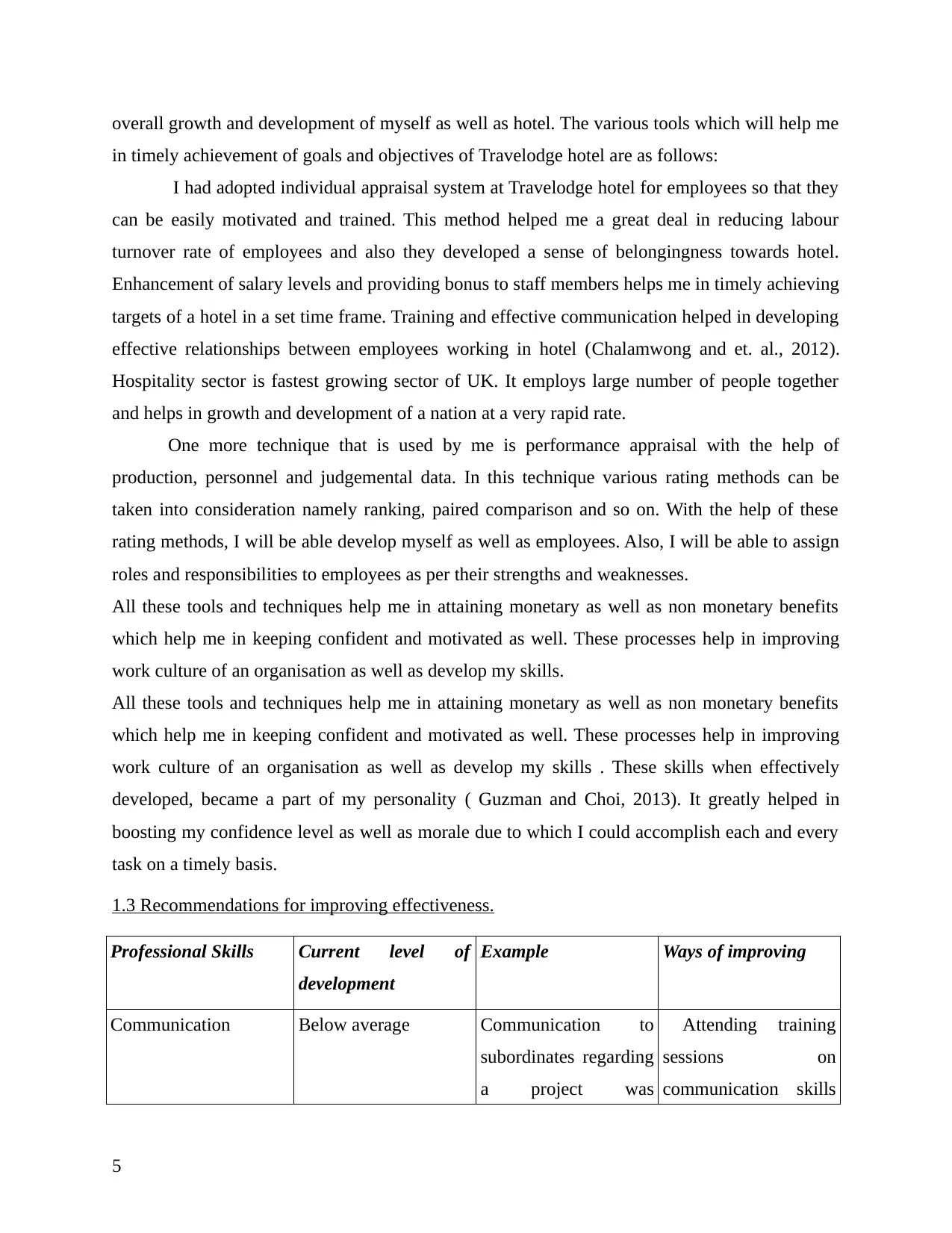
overall growth and development of myself as well as hotel. The various tools which will help me
in timely achievement of goals and objectives of Travelodge hotel are as follows:
I had adopted individual appraisal system at Travelodge hotel for employees so that they
can be easily motivated and trained. This method helped me a great deal in reducing labour
turnover rate of employees and also they developed a sense of belongingness towards hotel.
Enhancement of salary levels and providing bonus to staff members helps me in timely achieving
targets of a hotel in a set time frame. Training and effective communication helped in developing
effective relationships between employees working in hotel (Chalamwong and et. al., 2012).
Hospitality sector is fastest growing sector of UK. It employs large number of people together
and helps in growth and development of a nation at a very rapid rate.
One more technique that is used by me is performance appraisal with the help of
production, personnel and judgemental data. In this technique various rating methods can be
taken into consideration namely ranking, paired comparison and so on. With the help of these
rating methods, I will be able develop myself as well as employees. Also, I will be able to assign
roles and responsibilities to employees as per their strengths and weaknesses.
All these tools and techniques help me in attaining monetary as well as non monetary benefits
which help me in keeping confident and motivated as well. These processes help in improving
work culture of an organisation as well as develop my skills.
All these tools and techniques help me in attaining monetary as well as non monetary benefits
which help me in keeping confident and motivated as well. These processes help in improving
work culture of an organisation as well as develop my skills . These skills when effectively
developed, became a part of my personality ( Guzman and Choi, 2013). It greatly helped in
boosting my confidence level as well as morale due to which I could accomplish each and every
task on a timely basis.
1.3 Recommendations for improving effectiveness.
Professional Skills Current level of
development
Example Ways of improving
Communication Below average Communication to
subordinates regarding
a project was
Attending training
sessions on
communication skills
5
in timely achievement of goals and objectives of Travelodge hotel are as follows:
I had adopted individual appraisal system at Travelodge hotel for employees so that they
can be easily motivated and trained. This method helped me a great deal in reducing labour
turnover rate of employees and also they developed a sense of belongingness towards hotel.
Enhancement of salary levels and providing bonus to staff members helps me in timely achieving
targets of a hotel in a set time frame. Training and effective communication helped in developing
effective relationships between employees working in hotel (Chalamwong and et. al., 2012).
Hospitality sector is fastest growing sector of UK. It employs large number of people together
and helps in growth and development of a nation at a very rapid rate.
One more technique that is used by me is performance appraisal with the help of
production, personnel and judgemental data. In this technique various rating methods can be
taken into consideration namely ranking, paired comparison and so on. With the help of these
rating methods, I will be able develop myself as well as employees. Also, I will be able to assign
roles and responsibilities to employees as per their strengths and weaknesses.
All these tools and techniques help me in attaining monetary as well as non monetary benefits
which help me in keeping confident and motivated as well. These processes help in improving
work culture of an organisation as well as develop my skills.
All these tools and techniques help me in attaining monetary as well as non monetary benefits
which help me in keeping confident and motivated as well. These processes help in improving
work culture of an organisation as well as develop my skills . These skills when effectively
developed, became a part of my personality ( Guzman and Choi, 2013). It greatly helped in
boosting my confidence level as well as morale due to which I could accomplish each and every
task on a timely basis.
1.3 Recommendations for improving effectiveness.
Professional Skills Current level of
development
Example Ways of improving
Communication Below average Communication to
subordinates regarding
a project was
Attending training
sessions on
communication skills
5
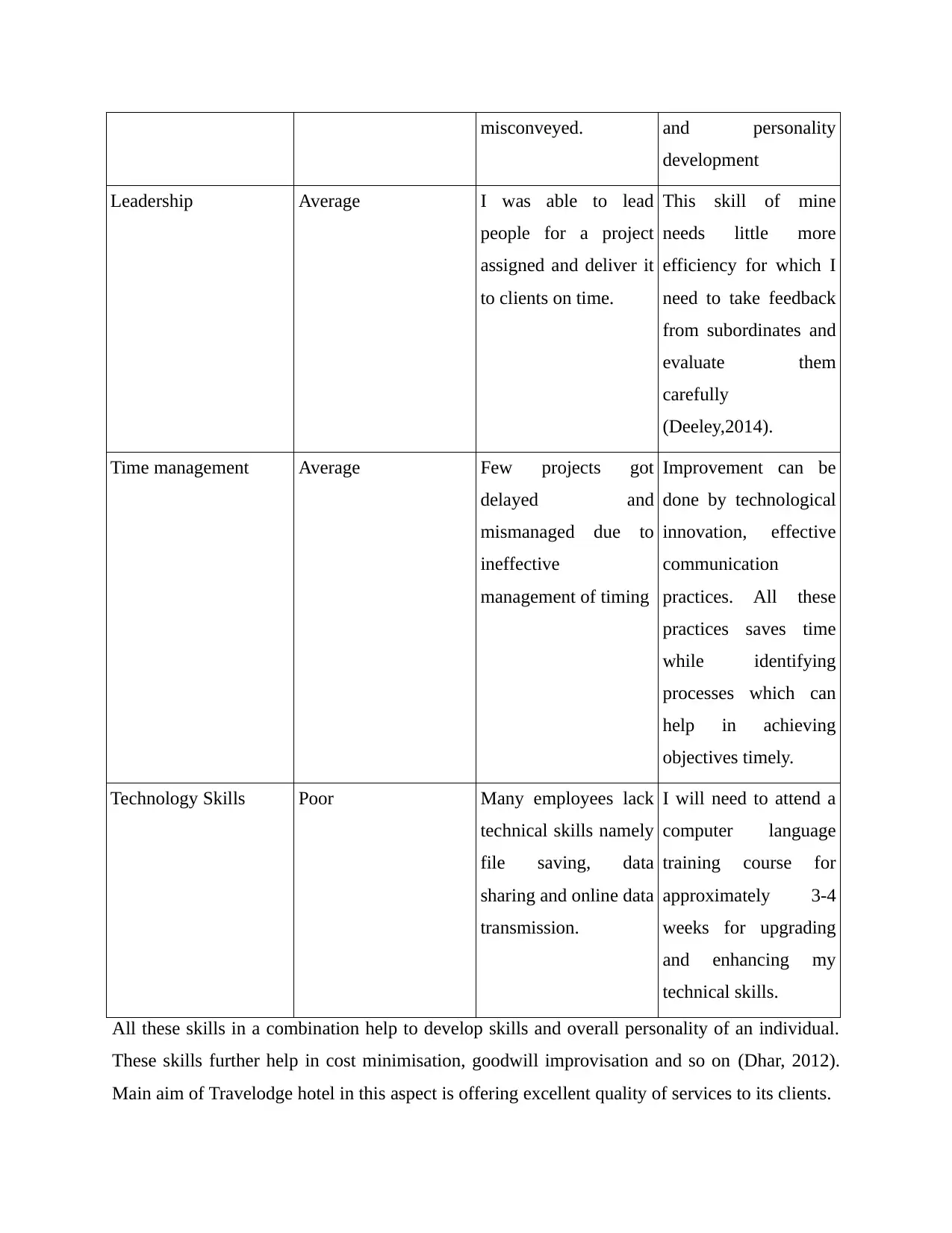
misconveyed. and personality
development
Leadership Average I was able to lead
people for a project
assigned and deliver it
to clients on time.
This skill of mine
needs little more
efficiency for which I
need to take feedback
from subordinates and
evaluate them
carefully
(Deeley,2014).
Time management Average Few projects got
delayed and
mismanaged due to
ineffective
management of timing
Improvement can be
done by technological
innovation, effective
communication
practices. All these
practices saves time
while identifying
processes which can
help in achieving
objectives timely.
Technology Skills Poor Many employees lack
technical skills namely
file saving, data
sharing and online data
transmission.
I will need to attend a
computer language
training course for
approximately 3-4
weeks for upgrading
and enhancing my
technical skills.
All these skills in a combination help to develop skills and overall personality of an individual.
These skills further help in cost minimisation, goodwill improvisation and so on (Dhar, 2012).
Main aim of Travelodge hotel in this aspect is offering excellent quality of services to its clients.
development
Leadership Average I was able to lead
people for a project
assigned and deliver it
to clients on time.
This skill of mine
needs little more
efficiency for which I
need to take feedback
from subordinates and
evaluate them
carefully
(Deeley,2014).
Time management Average Few projects got
delayed and
mismanaged due to
ineffective
management of timing
Improvement can be
done by technological
innovation, effective
communication
practices. All these
practices saves time
while identifying
processes which can
help in achieving
objectives timely.
Technology Skills Poor Many employees lack
technical skills namely
file saving, data
sharing and online data
transmission.
I will need to attend a
computer language
training course for
approximately 3-4
weeks for upgrading
and enhancing my
technical skills.
All these skills in a combination help to develop skills and overall personality of an individual.
These skills further help in cost minimisation, goodwill improvisation and so on (Dhar, 2012).
Main aim of Travelodge hotel in this aspect is offering excellent quality of services to its clients.
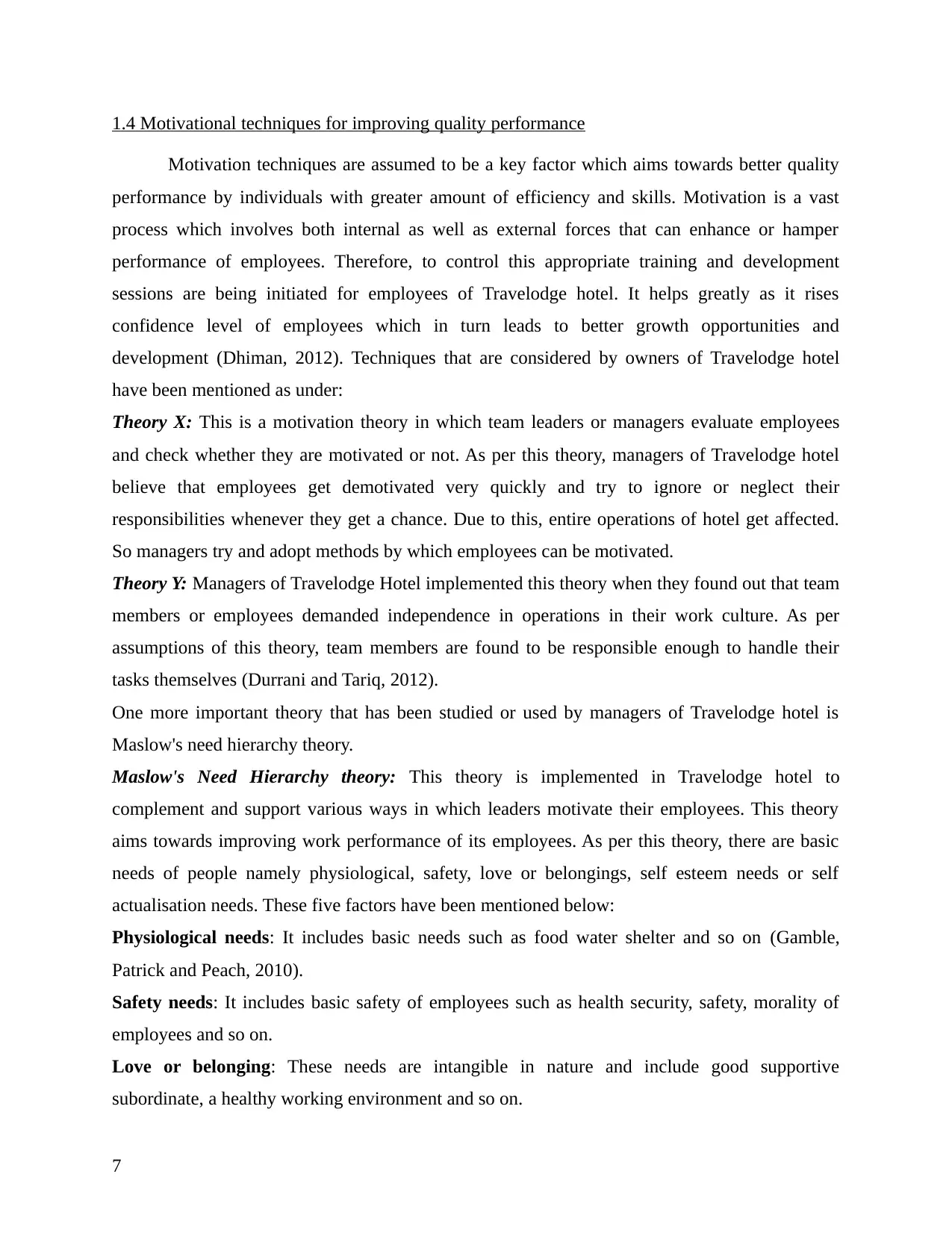
1.4 Motivational techniques for improving quality performance
Motivation techniques are assumed to be a key factor which aims towards better quality
performance by individuals with greater amount of efficiency and skills. Motivation is a vast
process which involves both internal as well as external forces that can enhance or hamper
performance of employees. Therefore, to control this appropriate training and development
sessions are being initiated for employees of Travelodge hotel. It helps greatly as it rises
confidence level of employees which in turn leads to better growth opportunities and
development (Dhiman, 2012). Techniques that are considered by owners of Travelodge hotel
have been mentioned as under:
Theory X: This is a motivation theory in which team leaders or managers evaluate employees
and check whether they are motivated or not. As per this theory, managers of Travelodge hotel
believe that employees get demotivated very quickly and try to ignore or neglect their
responsibilities whenever they get a chance. Due to this, entire operations of hotel get affected.
So managers try and adopt methods by which employees can be motivated.
Theory Y: Managers of Travelodge Hotel implemented this theory when they found out that team
members or employees demanded independence in operations in their work culture. As per
assumptions of this theory, team members are found to be responsible enough to handle their
tasks themselves (Durrani and Tariq, 2012).
One more important theory that has been studied or used by managers of Travelodge hotel is
Maslow's need hierarchy theory.
Maslow's Need Hierarchy theory: This theory is implemented in Travelodge hotel to
complement and support various ways in which leaders motivate their employees. This theory
aims towards improving work performance of its employees. As per this theory, there are basic
needs of people namely physiological, safety, love or belongings, self esteem needs or self
actualisation needs. These five factors have been mentioned below:
Physiological needs: It includes basic needs such as food water shelter and so on (Gamble,
Patrick and Peach, 2010).
Safety needs: It includes basic safety of employees such as health security, safety, morality of
employees and so on.
Love or belonging: These needs are intangible in nature and include good supportive
subordinate, a healthy working environment and so on.
7
Motivation techniques are assumed to be a key factor which aims towards better quality
performance by individuals with greater amount of efficiency and skills. Motivation is a vast
process which involves both internal as well as external forces that can enhance or hamper
performance of employees. Therefore, to control this appropriate training and development
sessions are being initiated for employees of Travelodge hotel. It helps greatly as it rises
confidence level of employees which in turn leads to better growth opportunities and
development (Dhiman, 2012). Techniques that are considered by owners of Travelodge hotel
have been mentioned as under:
Theory X: This is a motivation theory in which team leaders or managers evaluate employees
and check whether they are motivated or not. As per this theory, managers of Travelodge hotel
believe that employees get demotivated very quickly and try to ignore or neglect their
responsibilities whenever they get a chance. Due to this, entire operations of hotel get affected.
So managers try and adopt methods by which employees can be motivated.
Theory Y: Managers of Travelodge Hotel implemented this theory when they found out that team
members or employees demanded independence in operations in their work culture. As per
assumptions of this theory, team members are found to be responsible enough to handle their
tasks themselves (Durrani and Tariq, 2012).
One more important theory that has been studied or used by managers of Travelodge hotel is
Maslow's need hierarchy theory.
Maslow's Need Hierarchy theory: This theory is implemented in Travelodge hotel to
complement and support various ways in which leaders motivate their employees. This theory
aims towards improving work performance of its employees. As per this theory, there are basic
needs of people namely physiological, safety, love or belongings, self esteem needs or self
actualisation needs. These five factors have been mentioned below:
Physiological needs: It includes basic needs such as food water shelter and so on (Gamble,
Patrick and Peach, 2010).
Safety needs: It includes basic safety of employees such as health security, safety, morality of
employees and so on.
Love or belonging: These needs are intangible in nature and include good supportive
subordinate, a healthy working environment and so on.
7
Paraphrase This Document
Need a fresh take? Get an instant paraphrase of this document with our AI Paraphraser
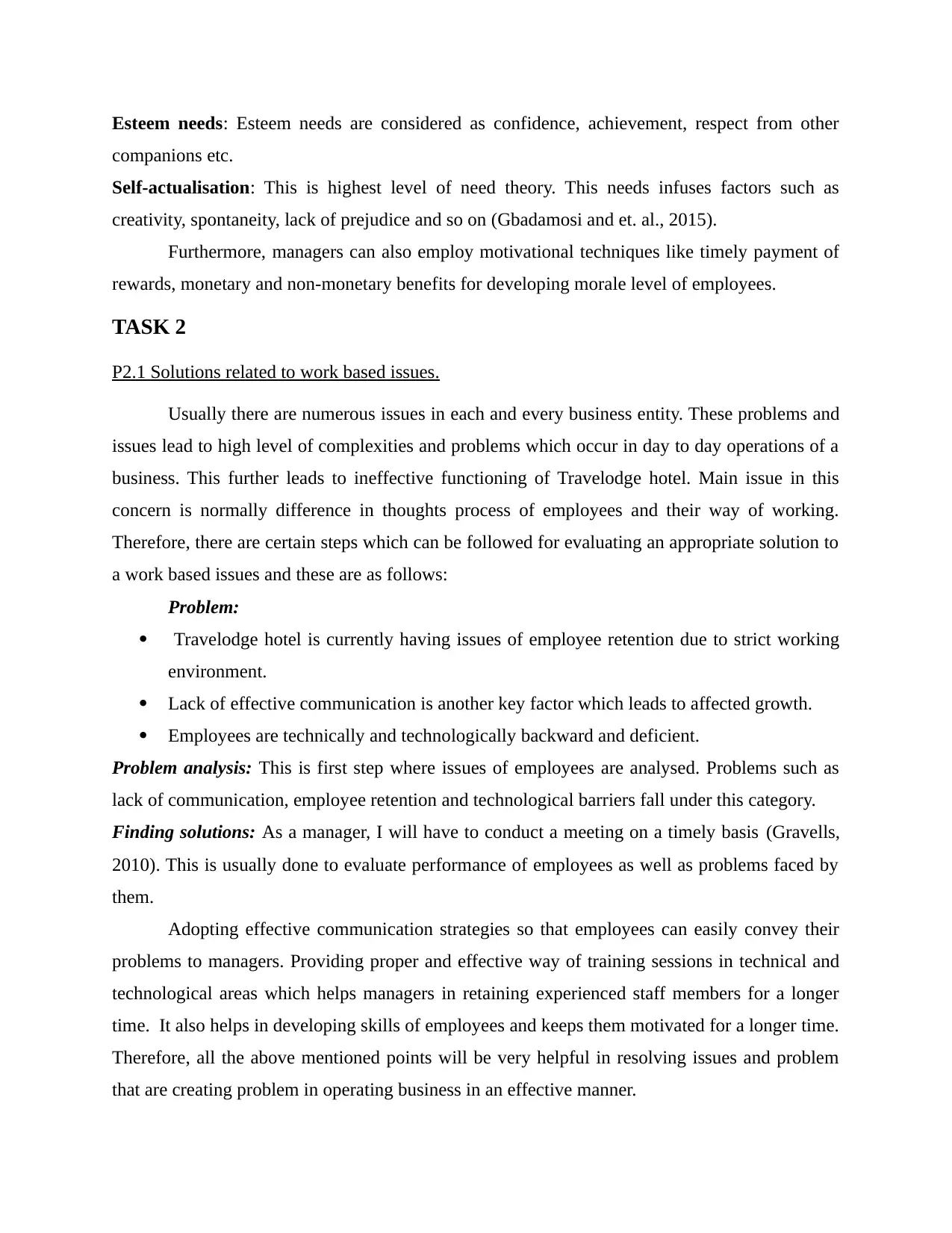
Esteem needs: Esteem needs are considered as confidence, achievement, respect from other
companions etc.
Self-actualisation: This is highest level of need theory. This needs infuses factors such as
creativity, spontaneity, lack of prejudice and so on (Gbadamosi and et. al., 2015).
Furthermore, managers can also employ motivational techniques like timely payment of
rewards, monetary and non-monetary benefits for developing morale level of employees.
TASK 2
P2.1 Solutions related to work based issues.
Usually there are numerous issues in each and every business entity. These problems and
issues lead to high level of complexities and problems which occur in day to day operations of a
business. This further leads to ineffective functioning of Travelodge hotel. Main issue in this
concern is normally difference in thoughts process of employees and their way of working.
Therefore, there are certain steps which can be followed for evaluating an appropriate solution to
a work based issues and these are as follows:
Problem:
Travelodge hotel is currently having issues of employee retention due to strict working
environment.
Lack of effective communication is another key factor which leads to affected growth.
Employees are technically and technologically backward and deficient.
Problem analysis: This is first step where issues of employees are analysed. Problems such as
lack of communication, employee retention and technological barriers fall under this category.
Finding solutions: As a manager, I will have to conduct a meeting on a timely basis (Gravells,
2010). This is usually done to evaluate performance of employees as well as problems faced by
them.
Adopting effective communication strategies so that employees can easily convey their
problems to managers. Providing proper and effective way of training sessions in technical and
technological areas which helps managers in retaining experienced staff members for a longer
time. It also helps in developing skills of employees and keeps them motivated for a longer time.
Therefore, all the above mentioned points will be very helpful in resolving issues and problem
that are creating problem in operating business in an effective manner.
companions etc.
Self-actualisation: This is highest level of need theory. This needs infuses factors such as
creativity, spontaneity, lack of prejudice and so on (Gbadamosi and et. al., 2015).
Furthermore, managers can also employ motivational techniques like timely payment of
rewards, monetary and non-monetary benefits for developing morale level of employees.
TASK 2
P2.1 Solutions related to work based issues.
Usually there are numerous issues in each and every business entity. These problems and
issues lead to high level of complexities and problems which occur in day to day operations of a
business. This further leads to ineffective functioning of Travelodge hotel. Main issue in this
concern is normally difference in thoughts process of employees and their way of working.
Therefore, there are certain steps which can be followed for evaluating an appropriate solution to
a work based issues and these are as follows:
Problem:
Travelodge hotel is currently having issues of employee retention due to strict working
environment.
Lack of effective communication is another key factor which leads to affected growth.
Employees are technically and technologically backward and deficient.
Problem analysis: This is first step where issues of employees are analysed. Problems such as
lack of communication, employee retention and technological barriers fall under this category.
Finding solutions: As a manager, I will have to conduct a meeting on a timely basis (Gravells,
2010). This is usually done to evaluate performance of employees as well as problems faced by
them.
Adopting effective communication strategies so that employees can easily convey their
problems to managers. Providing proper and effective way of training sessions in technical and
technological areas which helps managers in retaining experienced staff members for a longer
time. It also helps in developing skills of employees and keeps them motivated for a longer time.
Therefore, all the above mentioned points will be very helpful in resolving issues and problem
that are creating problem in operating business in an effective manner.
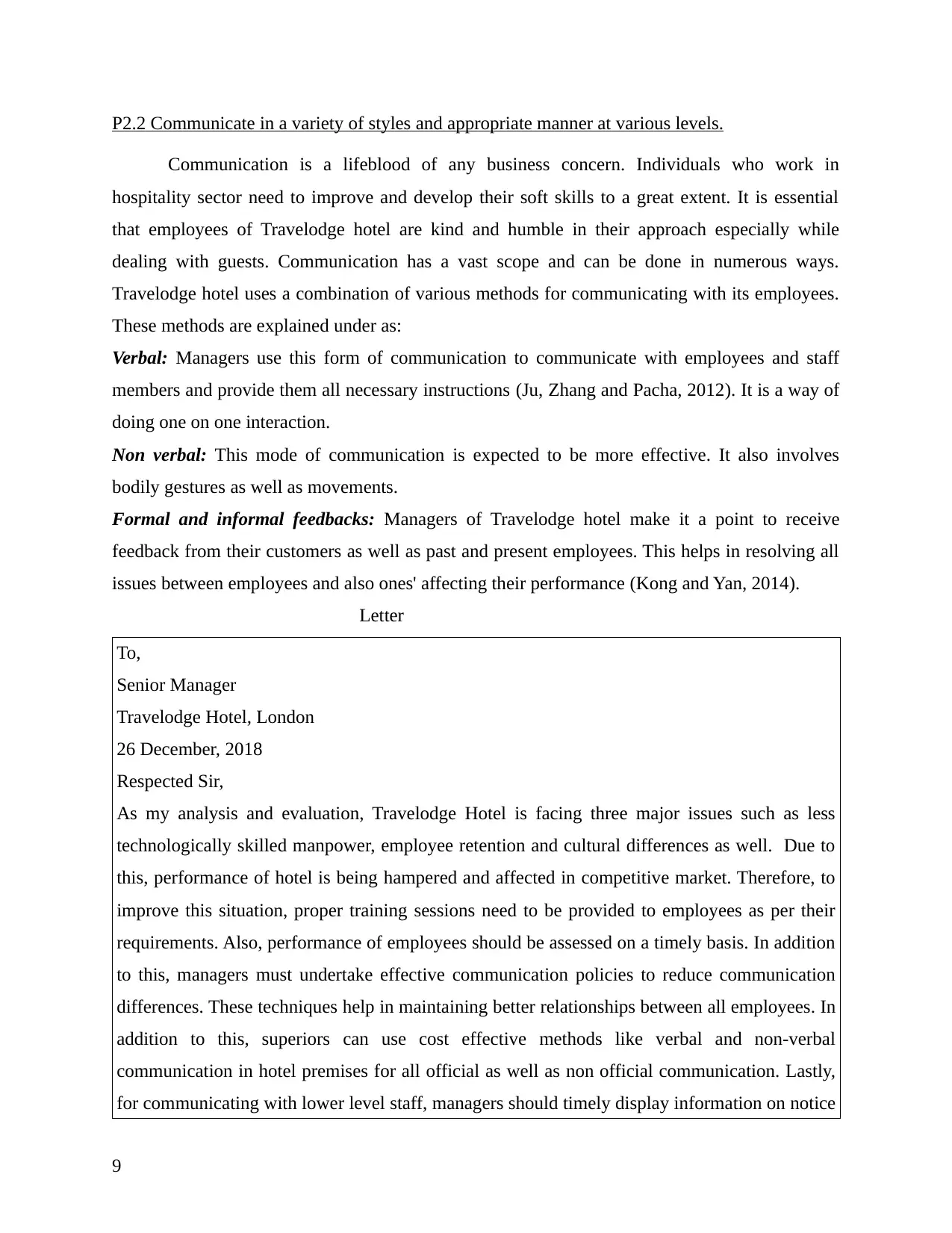
P2.2 Communicate in a variety of styles and appropriate manner at various levels.
Communication is a lifeblood of any business concern. Individuals who work in
hospitality sector need to improve and develop their soft skills to a great extent. It is essential
that employees of Travelodge hotel are kind and humble in their approach especially while
dealing with guests. Communication has a vast scope and can be done in numerous ways.
Travelodge hotel uses a combination of various methods for communicating with its employees.
These methods are explained under as:
Verbal: Managers use this form of communication to communicate with employees and staff
members and provide them all necessary instructions (Ju, Zhang and Pacha, 2012). It is a way of
doing one on one interaction.
Non verbal: This mode of communication is expected to be more effective. It also involves
bodily gestures as well as movements.
Formal and informal feedbacks: Managers of Travelodge hotel make it a point to receive
feedback from their customers as well as past and present employees. This helps in resolving all
issues between employees and also ones' affecting their performance (Kong and Yan, 2014).
Letter
To,
Senior Manager
Travelodge Hotel, London
26 December, 2018
Respected Sir,
As my analysis and evaluation, Travelodge Hotel is facing three major issues such as less
technologically skilled manpower, employee retention and cultural differences as well. Due to
this, performance of hotel is being hampered and affected in competitive market. Therefore, to
improve this situation, proper training sessions need to be provided to employees as per their
requirements. Also, performance of employees should be assessed on a timely basis. In addition
to this, managers must undertake effective communication policies to reduce communication
differences. These techniques help in maintaining better relationships between all employees. In
addition to this, superiors can use cost effective methods like verbal and non-verbal
communication in hotel premises for all official as well as non official communication. Lastly,
for communicating with lower level staff, managers should timely display information on notice
9
Communication is a lifeblood of any business concern. Individuals who work in
hospitality sector need to improve and develop their soft skills to a great extent. It is essential
that employees of Travelodge hotel are kind and humble in their approach especially while
dealing with guests. Communication has a vast scope and can be done in numerous ways.
Travelodge hotel uses a combination of various methods for communicating with its employees.
These methods are explained under as:
Verbal: Managers use this form of communication to communicate with employees and staff
members and provide them all necessary instructions (Ju, Zhang and Pacha, 2012). It is a way of
doing one on one interaction.
Non verbal: This mode of communication is expected to be more effective. It also involves
bodily gestures as well as movements.
Formal and informal feedbacks: Managers of Travelodge hotel make it a point to receive
feedback from their customers as well as past and present employees. This helps in resolving all
issues between employees and also ones' affecting their performance (Kong and Yan, 2014).
Letter
To,
Senior Manager
Travelodge Hotel, London
26 December, 2018
Respected Sir,
As my analysis and evaluation, Travelodge Hotel is facing three major issues such as less
technologically skilled manpower, employee retention and cultural differences as well. Due to
this, performance of hotel is being hampered and affected in competitive market. Therefore, to
improve this situation, proper training sessions need to be provided to employees as per their
requirements. Also, performance of employees should be assessed on a timely basis. In addition
to this, managers must undertake effective communication policies to reduce communication
differences. These techniques help in maintaining better relationships between all employees. In
addition to this, superiors can use cost effective methods like verbal and non-verbal
communication in hotel premises for all official as well as non official communication. Lastly,
for communicating with lower level staff, managers should timely display information on notice
9
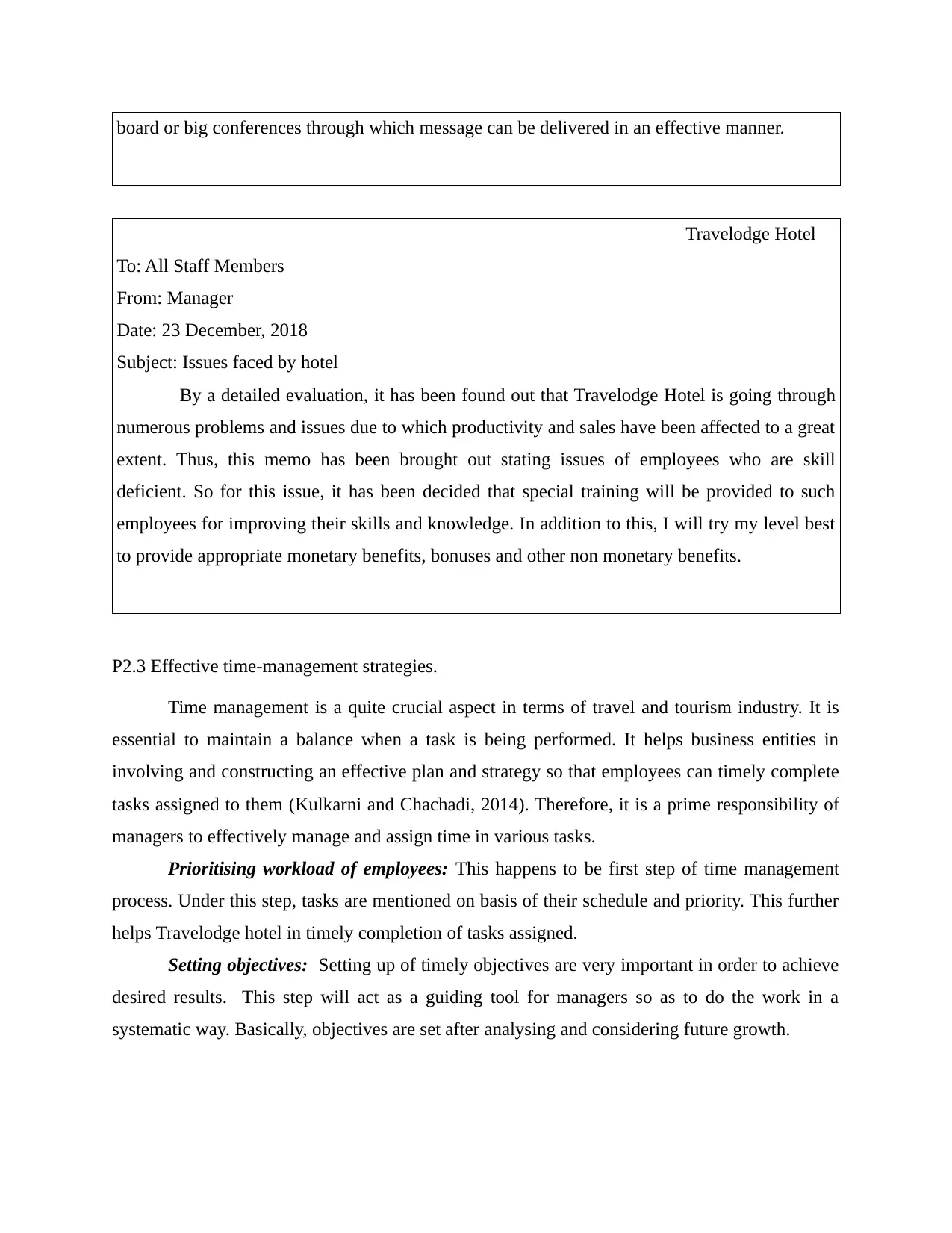
board or big conferences through which message can be delivered in an effective manner.
Travelodge Hotel
To: All Staff Members
From: Manager
Date: 23 December, 2018
Subject: Issues faced by hotel
By a detailed evaluation, it has been found out that Travelodge Hotel is going through
numerous problems and issues due to which productivity and sales have been affected to a great
extent. Thus, this memo has been brought out stating issues of employees who are skill
deficient. So for this issue, it has been decided that special training will be provided to such
employees for improving their skills and knowledge. In addition to this, I will try my level best
to provide appropriate monetary benefits, bonuses and other non monetary benefits.
P2.3 Effective time-management strategies.
Time management is a quite crucial aspect in terms of travel and tourism industry. It is
essential to maintain a balance when a task is being performed. It helps business entities in
involving and constructing an effective plan and strategy so that employees can timely complete
tasks assigned to them (Kulkarni and Chachadi, 2014). Therefore, it is a prime responsibility of
managers to effectively manage and assign time in various tasks.
Prioritising workload of employees: This happens to be first step of time management
process. Under this step, tasks are mentioned on basis of their schedule and priority. This further
helps Travelodge hotel in timely completion of tasks assigned.
Setting objectives: Setting up of timely objectives are very important in order to achieve
desired results. This step will act as a guiding tool for managers so as to do the work in a
systematic way. Basically, objectives are set after analysing and considering future growth.
Travelodge Hotel
To: All Staff Members
From: Manager
Date: 23 December, 2018
Subject: Issues faced by hotel
By a detailed evaluation, it has been found out that Travelodge Hotel is going through
numerous problems and issues due to which productivity and sales have been affected to a great
extent. Thus, this memo has been brought out stating issues of employees who are skill
deficient. So for this issue, it has been decided that special training will be provided to such
employees for improving their skills and knowledge. In addition to this, I will try my level best
to provide appropriate monetary benefits, bonuses and other non monetary benefits.
P2.3 Effective time-management strategies.
Time management is a quite crucial aspect in terms of travel and tourism industry. It is
essential to maintain a balance when a task is being performed. It helps business entities in
involving and constructing an effective plan and strategy so that employees can timely complete
tasks assigned to them (Kulkarni and Chachadi, 2014). Therefore, it is a prime responsibility of
managers to effectively manage and assign time in various tasks.
Prioritising workload of employees: This happens to be first step of time management
process. Under this step, tasks are mentioned on basis of their schedule and priority. This further
helps Travelodge hotel in timely completion of tasks assigned.
Setting objectives: Setting up of timely objectives are very important in order to achieve
desired results. This step will act as a guiding tool for managers so as to do the work in a
systematic way. Basically, objectives are set after analysing and considering future growth.
Secure Best Marks with AI Grader
Need help grading? Try our AI Grader for instant feedback on your assignments.
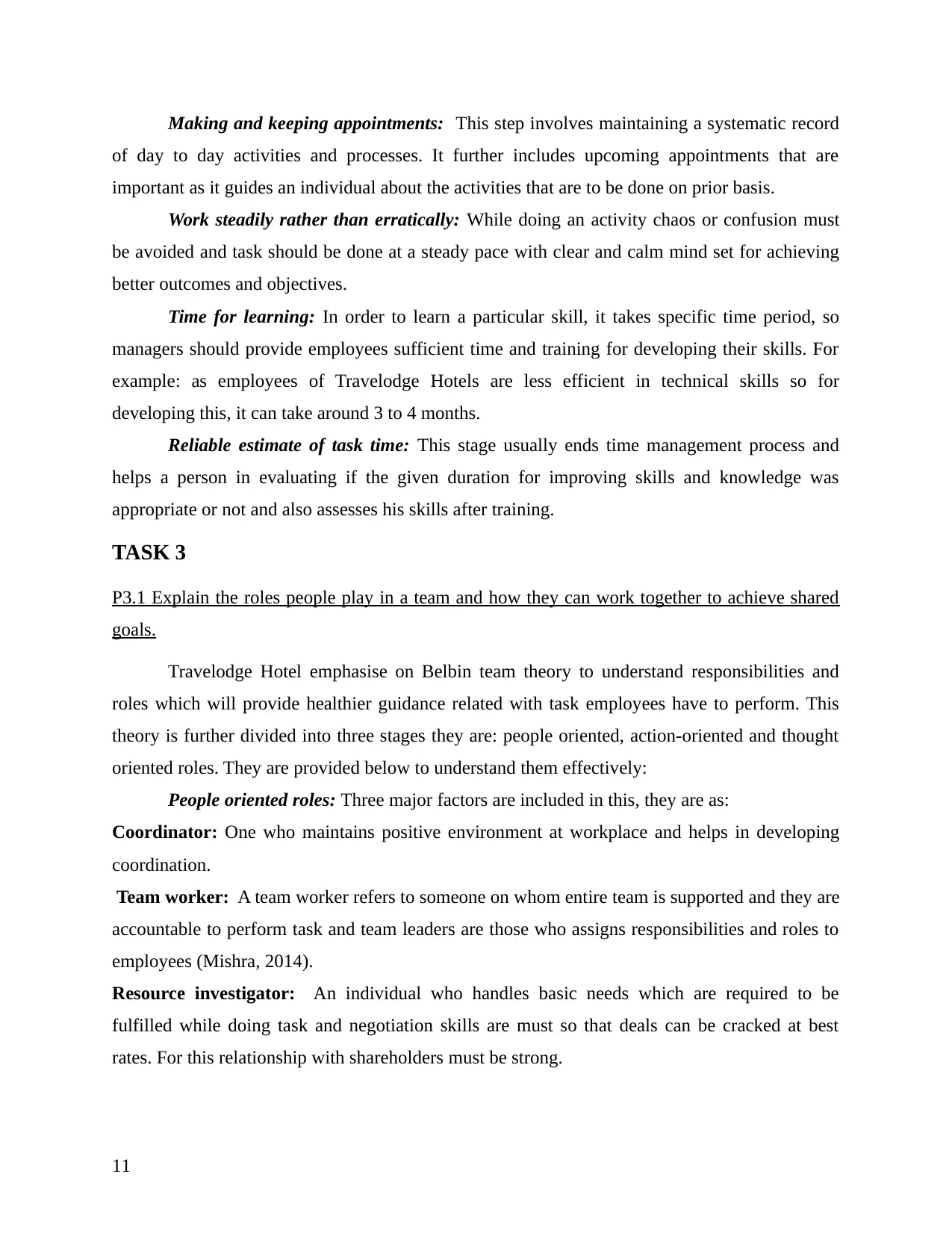
Making and keeping appointments: This step involves maintaining a systematic record
of day to day activities and processes. It further includes upcoming appointments that are
important as it guides an individual about the activities that are to be done on prior basis.
Work steadily rather than erratically: While doing an activity chaos or confusion must
be avoided and task should be done at a steady pace with clear and calm mind set for achieving
better outcomes and objectives.
Time for learning: In order to learn a particular skill, it takes specific time period, so
managers should provide employees sufficient time and training for developing their skills. For
example: as employees of Travelodge Hotels are less efficient in technical skills so for
developing this, it can take around 3 to 4 months.
Reliable estimate of task time: This stage usually ends time management process and
helps a person in evaluating if the given duration for improving skills and knowledge was
appropriate or not and also assesses his skills after training.
TASK 3
P3.1 Explain the roles people play in a team and how they can work together to achieve shared
goals.
Travelodge Hotel emphasise on Belbin team theory to understand responsibilities and
roles which will provide healthier guidance related with task employees have to perform. This
theory is further divided into three stages they are: people oriented, action-oriented and thought
oriented roles. They are provided below to understand them effectively:
People oriented roles: Three major factors are included in this, they are as:
Coordinator: One who maintains positive environment at workplace and helps in developing
coordination.
Team worker: A team worker refers to someone on whom entire team is supported and they are
accountable to perform task and team leaders are those who assigns responsibilities and roles to
employees (Mishra, 2014).
Resource investigator: An individual who handles basic needs which are required to be
fulfilled while doing task and negotiation skills are must so that deals can be cracked at best
rates. For this relationship with shareholders must be strong.
11
of day to day activities and processes. It further includes upcoming appointments that are
important as it guides an individual about the activities that are to be done on prior basis.
Work steadily rather than erratically: While doing an activity chaos or confusion must
be avoided and task should be done at a steady pace with clear and calm mind set for achieving
better outcomes and objectives.
Time for learning: In order to learn a particular skill, it takes specific time period, so
managers should provide employees sufficient time and training for developing their skills. For
example: as employees of Travelodge Hotels are less efficient in technical skills so for
developing this, it can take around 3 to 4 months.
Reliable estimate of task time: This stage usually ends time management process and
helps a person in evaluating if the given duration for improving skills and knowledge was
appropriate or not and also assesses his skills after training.
TASK 3
P3.1 Explain the roles people play in a team and how they can work together to achieve shared
goals.
Travelodge Hotel emphasise on Belbin team theory to understand responsibilities and
roles which will provide healthier guidance related with task employees have to perform. This
theory is further divided into three stages they are: people oriented, action-oriented and thought
oriented roles. They are provided below to understand them effectively:
People oriented roles: Three major factors are included in this, they are as:
Coordinator: One who maintains positive environment at workplace and helps in developing
coordination.
Team worker: A team worker refers to someone on whom entire team is supported and they are
accountable to perform task and team leaders are those who assigns responsibilities and roles to
employees (Mishra, 2014).
Resource investigator: An individual who handles basic needs which are required to be
fulfilled while doing task and negotiation skills are must so that deals can be cracked at best
rates. For this relationship with shareholders must be strong.
11
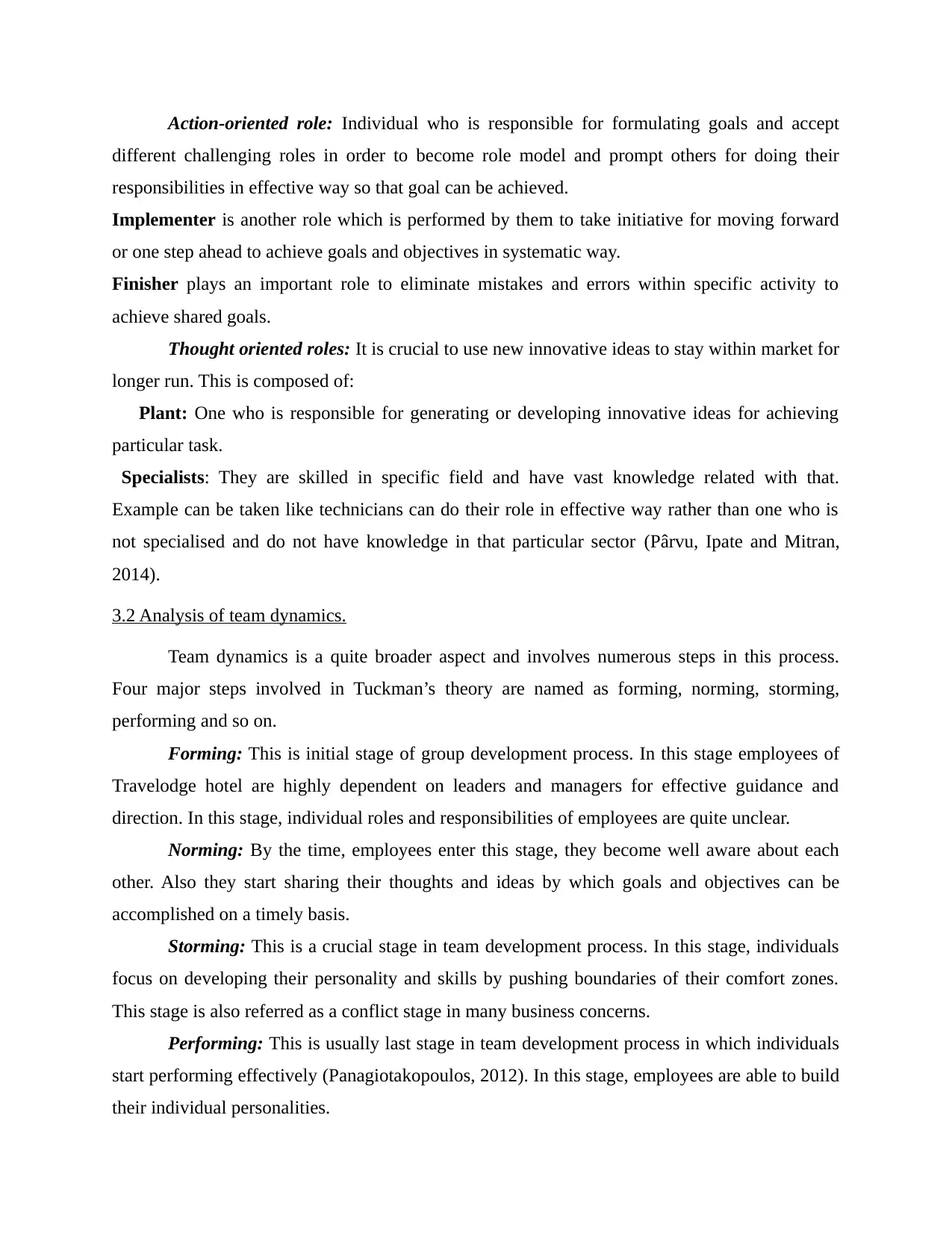
Action-oriented role: Individual who is responsible for formulating goals and accept
different challenging roles in order to become role model and prompt others for doing their
responsibilities in effective way so that goal can be achieved.
Implementer is another role which is performed by them to take initiative for moving forward
or one step ahead to achieve goals and objectives in systematic way.
Finisher plays an important role to eliminate mistakes and errors within specific activity to
achieve shared goals.
Thought oriented roles: It is crucial to use new innovative ideas to stay within market for
longer run. This is composed of:
Plant: One who is responsible for generating or developing innovative ideas for achieving
particular task.
Specialists: They are skilled in specific field and have vast knowledge related with that.
Example can be taken like technicians can do their role in effective way rather than one who is
not specialised and do not have knowledge in that particular sector (Pârvu, Ipate and Mitran,
2014).
3.2 Analysis of team dynamics.
Team dynamics is a quite broader aspect and involves numerous steps in this process.
Four major steps involved in Tuckman’s theory are named as forming, norming, storming,
performing and so on.
Forming: This is initial stage of group development process. In this stage employees of
Travelodge hotel are highly dependent on leaders and managers for effective guidance and
direction. In this stage, individual roles and responsibilities of employees are quite unclear.
Norming: By the time, employees enter this stage, they become well aware about each
other. Also they start sharing their thoughts and ideas by which goals and objectives can be
accomplished on a timely basis.
Storming: This is a crucial stage in team development process. In this stage, individuals
focus on developing their personality and skills by pushing boundaries of their comfort zones.
This stage is also referred as a conflict stage in many business concerns.
Performing: This is usually last stage in team development process in which individuals
start performing effectively (Panagiotakopoulos, 2012). In this stage, employees are able to build
their individual personalities.
different challenging roles in order to become role model and prompt others for doing their
responsibilities in effective way so that goal can be achieved.
Implementer is another role which is performed by them to take initiative for moving forward
or one step ahead to achieve goals and objectives in systematic way.
Finisher plays an important role to eliminate mistakes and errors within specific activity to
achieve shared goals.
Thought oriented roles: It is crucial to use new innovative ideas to stay within market for
longer run. This is composed of:
Plant: One who is responsible for generating or developing innovative ideas for achieving
particular task.
Specialists: They are skilled in specific field and have vast knowledge related with that.
Example can be taken like technicians can do their role in effective way rather than one who is
not specialised and do not have knowledge in that particular sector (Pârvu, Ipate and Mitran,
2014).
3.2 Analysis of team dynamics.
Team dynamics is a quite broader aspect and involves numerous steps in this process.
Four major steps involved in Tuckman’s theory are named as forming, norming, storming,
performing and so on.
Forming: This is initial stage of group development process. In this stage employees of
Travelodge hotel are highly dependent on leaders and managers for effective guidance and
direction. In this stage, individual roles and responsibilities of employees are quite unclear.
Norming: By the time, employees enter this stage, they become well aware about each
other. Also they start sharing their thoughts and ideas by which goals and objectives can be
accomplished on a timely basis.
Storming: This is a crucial stage in team development process. In this stage, individuals
focus on developing their personality and skills by pushing boundaries of their comfort zones.
This stage is also referred as a conflict stage in many business concerns.
Performing: This is usually last stage in team development process in which individuals
start performing effectively (Panagiotakopoulos, 2012). In this stage, employees are able to build
their individual personalities.
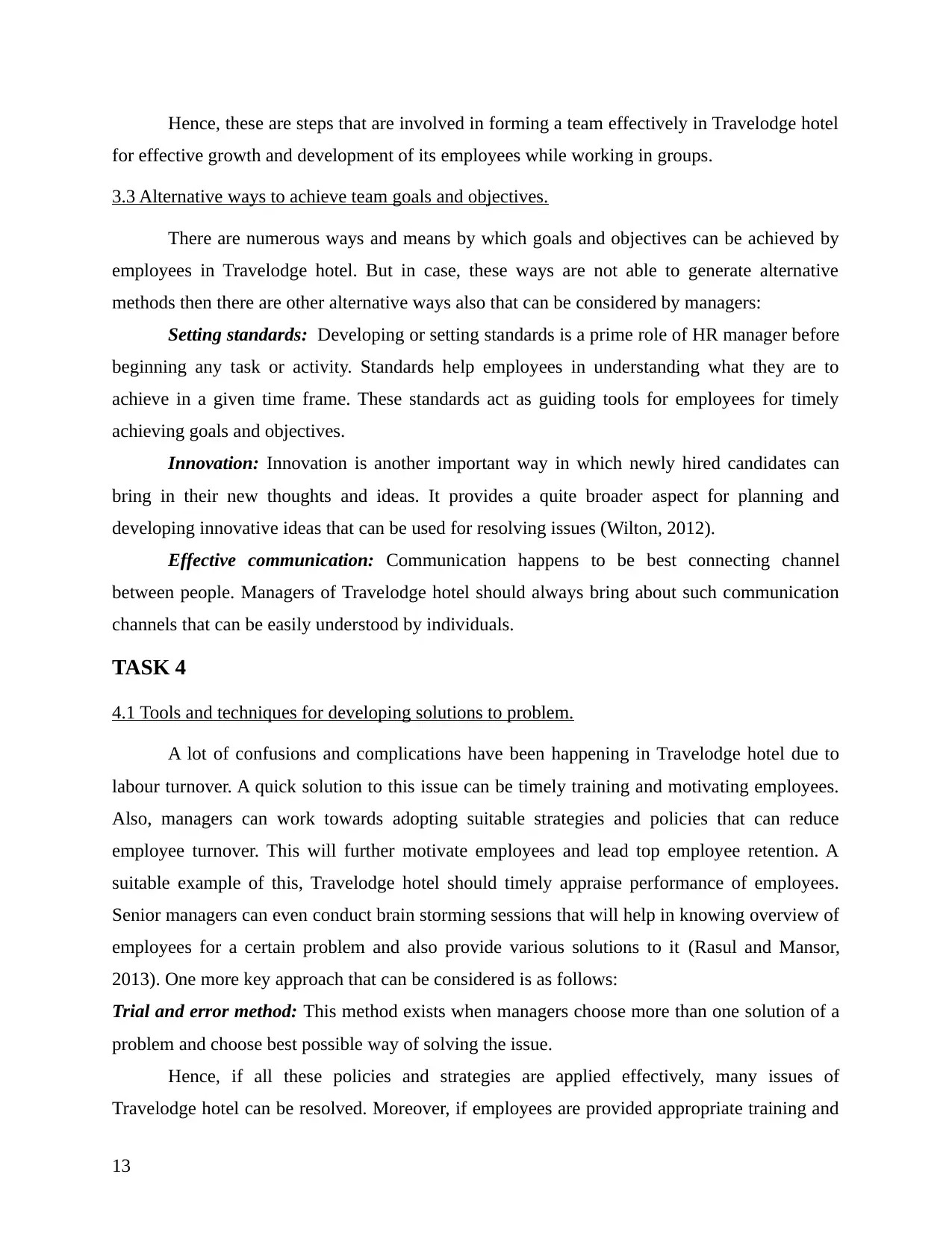
Hence, these are steps that are involved in forming a team effectively in Travelodge hotel
for effective growth and development of its employees while working in groups.
3.3 Alternative ways to achieve team goals and objectives.
There are numerous ways and means by which goals and objectives can be achieved by
employees in Travelodge hotel. But in case, these ways are not able to generate alternative
methods then there are other alternative ways also that can be considered by managers:
Setting standards: Developing or setting standards is a prime role of HR manager before
beginning any task or activity. Standards help employees in understanding what they are to
achieve in a given time frame. These standards act as guiding tools for employees for timely
achieving goals and objectives.
Innovation: Innovation is another important way in which newly hired candidates can
bring in their new thoughts and ideas. It provides a quite broader aspect for planning and
developing innovative ideas that can be used for resolving issues (Wilton, 2012).
Effective communication: Communication happens to be best connecting channel
between people. Managers of Travelodge hotel should always bring about such communication
channels that can be easily understood by individuals.
TASK 4
4.1 Tools and techniques for developing solutions to problem.
A lot of confusions and complications have been happening in Travelodge hotel due to
labour turnover. A quick solution to this issue can be timely training and motivating employees.
Also, managers can work towards adopting suitable strategies and policies that can reduce
employee turnover. This will further motivate employees and lead top employee retention. A
suitable example of this, Travelodge hotel should timely appraise performance of employees.
Senior managers can even conduct brain storming sessions that will help in knowing overview of
employees for a certain problem and also provide various solutions to it (Rasul and Mansor,
2013). One more key approach that can be considered is as follows:
Trial and error method: This method exists when managers choose more than one solution of a
problem and choose best possible way of solving the issue.
Hence, if all these policies and strategies are applied effectively, many issues of
Travelodge hotel can be resolved. Moreover, if employees are provided appropriate training and
13
for effective growth and development of its employees while working in groups.
3.3 Alternative ways to achieve team goals and objectives.
There are numerous ways and means by which goals and objectives can be achieved by
employees in Travelodge hotel. But in case, these ways are not able to generate alternative
methods then there are other alternative ways also that can be considered by managers:
Setting standards: Developing or setting standards is a prime role of HR manager before
beginning any task or activity. Standards help employees in understanding what they are to
achieve in a given time frame. These standards act as guiding tools for employees for timely
achieving goals and objectives.
Innovation: Innovation is another important way in which newly hired candidates can
bring in their new thoughts and ideas. It provides a quite broader aspect for planning and
developing innovative ideas that can be used for resolving issues (Wilton, 2012).
Effective communication: Communication happens to be best connecting channel
between people. Managers of Travelodge hotel should always bring about such communication
channels that can be easily understood by individuals.
TASK 4
4.1 Tools and techniques for developing solutions to problem.
A lot of confusions and complications have been happening in Travelodge hotel due to
labour turnover. A quick solution to this issue can be timely training and motivating employees.
Also, managers can work towards adopting suitable strategies and policies that can reduce
employee turnover. This will further motivate employees and lead top employee retention. A
suitable example of this, Travelodge hotel should timely appraise performance of employees.
Senior managers can even conduct brain storming sessions that will help in knowing overview of
employees for a certain problem and also provide various solutions to it (Rasul and Mansor,
2013). One more key approach that can be considered is as follows:
Trial and error method: This method exists when managers choose more than one solution of a
problem and choose best possible way of solving the issue.
Hence, if all these policies and strategies are applied effectively, many issues of
Travelodge hotel can be resolved. Moreover, if employees are provided appropriate training and
13
Paraphrase This Document
Need a fresh take? Get an instant paraphrase of this document with our AI Paraphraser
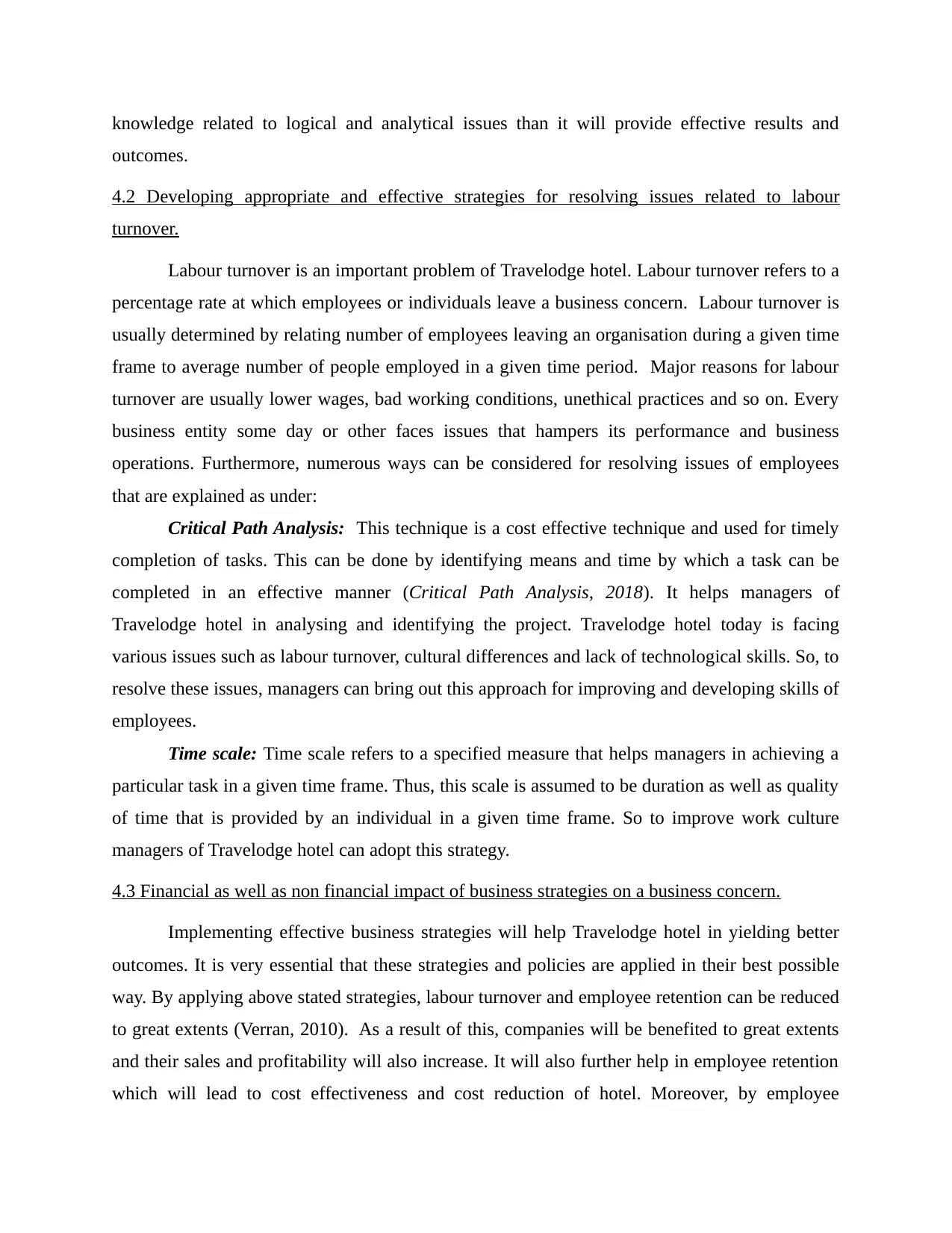
knowledge related to logical and analytical issues than it will provide effective results and
outcomes.
4.2 Developing appropriate and effective strategies for resolving issues related to labour
turnover.
Labour turnover is an important problem of Travelodge hotel. Labour turnover refers to a
percentage rate at which employees or individuals leave a business concern. Labour turnover is
usually determined by relating number of employees leaving an organisation during a given time
frame to average number of people employed in a given time period. Major reasons for labour
turnover are usually lower wages, bad working conditions, unethical practices and so on. Every
business entity some day or other faces issues that hampers its performance and business
operations. Furthermore, numerous ways can be considered for resolving issues of employees
that are explained as under:
Critical Path Analysis: This technique is a cost effective technique and used for timely
completion of tasks. This can be done by identifying means and time by which a task can be
completed in an effective manner (Critical Path Analysis, 2018). It helps managers of
Travelodge hotel in analysing and identifying the project. Travelodge hotel today is facing
various issues such as labour turnover, cultural differences and lack of technological skills. So, to
resolve these issues, managers can bring out this approach for improving and developing skills of
employees.
Time scale: Time scale refers to a specified measure that helps managers in achieving a
particular task in a given time frame. Thus, this scale is assumed to be duration as well as quality
of time that is provided by an individual in a given time frame. So to improve work culture
managers of Travelodge hotel can adopt this strategy.
4.3 Financial as well as non financial impact of business strategies on a business concern.
Implementing effective business strategies will help Travelodge hotel in yielding better
outcomes. It is very essential that these strategies and policies are applied in their best possible
way. By applying above stated strategies, labour turnover and employee retention can be reduced
to great extents (Verran, 2010). As a result of this, companies will be benefited to great extents
and their sales and profitability will also increase. It will also further help in employee retention
which will lead to cost effectiveness and cost reduction of hotel. Moreover, by employee
outcomes.
4.2 Developing appropriate and effective strategies for resolving issues related to labour
turnover.
Labour turnover is an important problem of Travelodge hotel. Labour turnover refers to a
percentage rate at which employees or individuals leave a business concern. Labour turnover is
usually determined by relating number of employees leaving an organisation during a given time
frame to average number of people employed in a given time period. Major reasons for labour
turnover are usually lower wages, bad working conditions, unethical practices and so on. Every
business entity some day or other faces issues that hampers its performance and business
operations. Furthermore, numerous ways can be considered for resolving issues of employees
that are explained as under:
Critical Path Analysis: This technique is a cost effective technique and used for timely
completion of tasks. This can be done by identifying means and time by which a task can be
completed in an effective manner (Critical Path Analysis, 2018). It helps managers of
Travelodge hotel in analysing and identifying the project. Travelodge hotel today is facing
various issues such as labour turnover, cultural differences and lack of technological skills. So, to
resolve these issues, managers can bring out this approach for improving and developing skills of
employees.
Time scale: Time scale refers to a specified measure that helps managers in achieving a
particular task in a given time frame. Thus, this scale is assumed to be duration as well as quality
of time that is provided by an individual in a given time frame. So to improve work culture
managers of Travelodge hotel can adopt this strategy.
4.3 Financial as well as non financial impact of business strategies on a business concern.
Implementing effective business strategies will help Travelodge hotel in yielding better
outcomes. It is very essential that these strategies and policies are applied in their best possible
way. By applying above stated strategies, labour turnover and employee retention can be reduced
to great extents (Verran, 2010). As a result of this, companies will be benefited to great extents
and their sales and profitability will also increase. It will also further help in employee retention
which will lead to cost effectiveness and cost reduction of hotel. Moreover, by employee
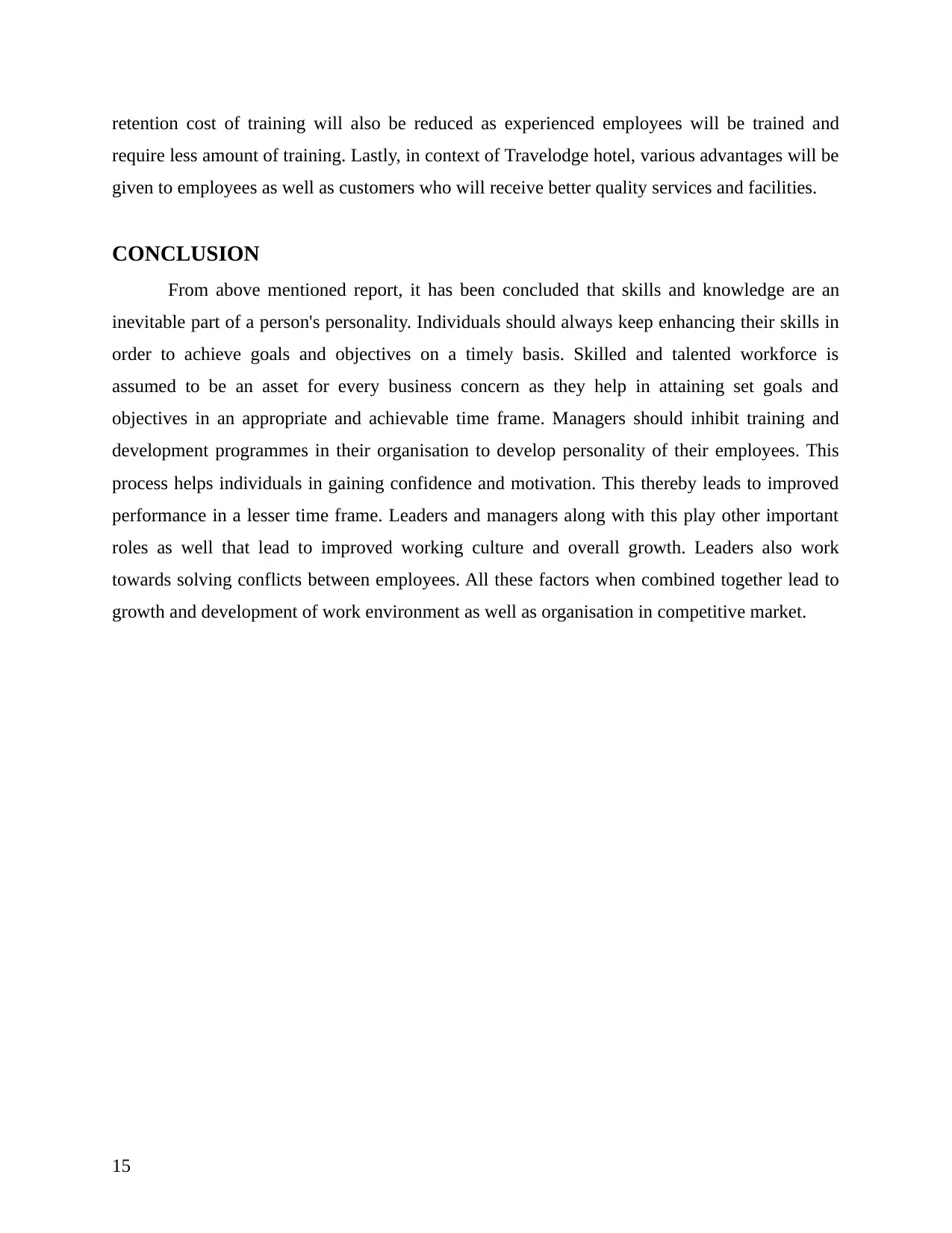
retention cost of training will also be reduced as experienced employees will be trained and
require less amount of training. Lastly, in context of Travelodge hotel, various advantages will be
given to employees as well as customers who will receive better quality services and facilities.
CONCLUSION
From above mentioned report, it has been concluded that skills and knowledge are an
inevitable part of a person's personality. Individuals should always keep enhancing their skills in
order to achieve goals and objectives on a timely basis. Skilled and talented workforce is
assumed to be an asset for every business concern as they help in attaining set goals and
objectives in an appropriate and achievable time frame. Managers should inhibit training and
development programmes in their organisation to develop personality of their employees. This
process helps individuals in gaining confidence and motivation. This thereby leads to improved
performance in a lesser time frame. Leaders and managers along with this play other important
roles as well that lead to improved working culture and overall growth. Leaders also work
towards solving conflicts between employees. All these factors when combined together lead to
growth and development of work environment as well as organisation in competitive market.
15
require less amount of training. Lastly, in context of Travelodge hotel, various advantages will be
given to employees as well as customers who will receive better quality services and facilities.
CONCLUSION
From above mentioned report, it has been concluded that skills and knowledge are an
inevitable part of a person's personality. Individuals should always keep enhancing their skills in
order to achieve goals and objectives on a timely basis. Skilled and talented workforce is
assumed to be an asset for every business concern as they help in attaining set goals and
objectives in an appropriate and achievable time frame. Managers should inhibit training and
development programmes in their organisation to develop personality of their employees. This
process helps individuals in gaining confidence and motivation. This thereby leads to improved
performance in a lesser time frame. Leaders and managers along with this play other important
roles as well that lead to improved working culture and overall growth. Leaders also work
towards solving conflicts between employees. All these factors when combined together lead to
growth and development of work environment as well as organisation in competitive market.
15
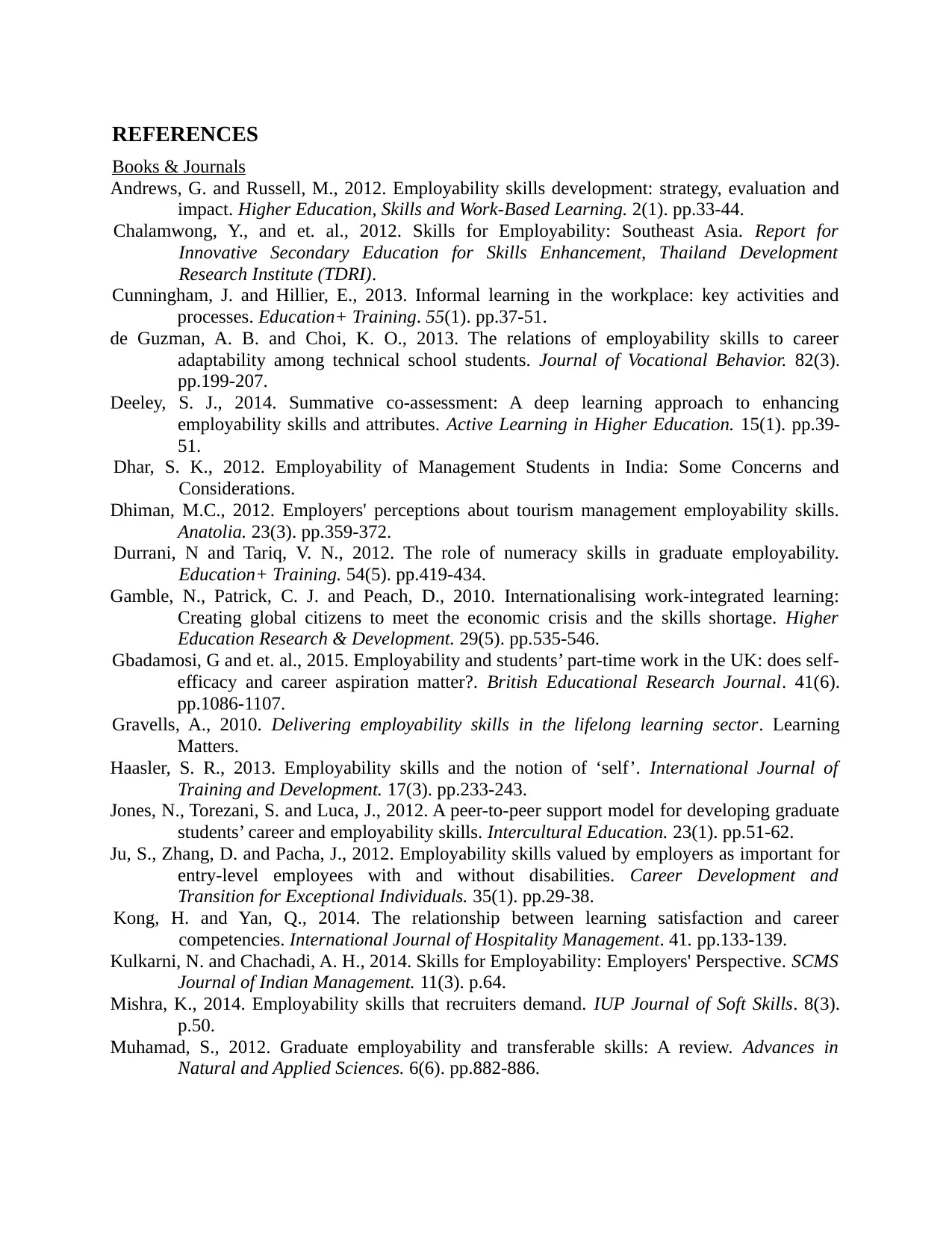
REFERENCES
Books & Journals
Andrews, G. and Russell, M., 2012. Employability skills development: strategy, evaluation and
impact. Higher Education, Skills and Work-Based Learning. 2(1). pp.33-44.
Chalamwong, Y., and et. al., 2012. Skills for Employability: Southeast Asia. Report for
Innovative Secondary Education for Skills Enhancement, Thailand Development
Research Institute (TDRI).
Cunningham, J. and Hillier, E., 2013. Informal learning in the workplace: key activities and
processes. Education+ Training. 55(1). pp.37-51.
de Guzman, A. B. and Choi, K. O., 2013. The relations of employability skills to career
adaptability among technical school students. Journal of Vocational Behavior. 82(3).
pp.199-207.
Deeley, S. J., 2014. Summative co-assessment: A deep learning approach to enhancing
employability skills and attributes. Active Learning in Higher Education. 15(1). pp.39-
51.
Dhar, S. K., 2012. Employability of Management Students in India: Some Concerns and
Considerations.
Dhiman, M.C., 2012. Employers' perceptions about tourism management employability skills.
Anatolia. 23(3). pp.359-372.
Durrani, N and Tariq, V. N., 2012. The role of numeracy skills in graduate employability.
Education+ Training. 54(5). pp.419-434.
Gamble, N., Patrick, C. J. and Peach, D., 2010. Internationalising work‐integrated learning:
Creating global citizens to meet the economic crisis and the skills shortage. Higher
Education Research & Development. 29(5). pp.535-546.
Gbadamosi, G and et. al., 2015. Employability and students’ part‐time work in the UK: does self‐
efficacy and career aspiration matter?. British Educational Research Journal. 41(6).
pp.1086-1107.
Gravells, A., 2010. Delivering employability skills in the lifelong learning sector. Learning
Matters.
Haasler, S. R., 2013. Employability skills and the notion of ‘self’. International Journal of
Training and Development. 17(3). pp.233-243.
Jones, N., Torezani, S. and Luca, J., 2012. A peer-to-peer support model for developing graduate
students’ career and employability skills. Intercultural Education. 23(1). pp.51-62.
Ju, S., Zhang, D. and Pacha, J., 2012. Employability skills valued by employers as important for
entry-level employees with and without disabilities. Career Development and
Transition for Exceptional Individuals. 35(1). pp.29-38.
Kong, H. and Yan, Q., 2014. The relationship between learning satisfaction and career
competencies. International Journal of Hospitality Management. 41. pp.133-139.
Kulkarni, N. and Chachadi, A. H., 2014. Skills for Employability: Employers' Perspective. SCMS
Journal of Indian Management. 11(3). p.64.
Mishra, K., 2014. Employability skills that recruiters demand. IUP Journal of Soft Skills. 8(3).
p.50.
Muhamad, S., 2012. Graduate employability and transferable skills: A review. Advances in
Natural and Applied Sciences. 6(6). pp.882-886.
Books & Journals
Andrews, G. and Russell, M., 2012. Employability skills development: strategy, evaluation and
impact. Higher Education, Skills and Work-Based Learning. 2(1). pp.33-44.
Chalamwong, Y., and et. al., 2012. Skills for Employability: Southeast Asia. Report for
Innovative Secondary Education for Skills Enhancement, Thailand Development
Research Institute (TDRI).
Cunningham, J. and Hillier, E., 2013. Informal learning in the workplace: key activities and
processes. Education+ Training. 55(1). pp.37-51.
de Guzman, A. B. and Choi, K. O., 2013. The relations of employability skills to career
adaptability among technical school students. Journal of Vocational Behavior. 82(3).
pp.199-207.
Deeley, S. J., 2014. Summative co-assessment: A deep learning approach to enhancing
employability skills and attributes. Active Learning in Higher Education. 15(1). pp.39-
51.
Dhar, S. K., 2012. Employability of Management Students in India: Some Concerns and
Considerations.
Dhiman, M.C., 2012. Employers' perceptions about tourism management employability skills.
Anatolia. 23(3). pp.359-372.
Durrani, N and Tariq, V. N., 2012. The role of numeracy skills in graduate employability.
Education+ Training. 54(5). pp.419-434.
Gamble, N., Patrick, C. J. and Peach, D., 2010. Internationalising work‐integrated learning:
Creating global citizens to meet the economic crisis and the skills shortage. Higher
Education Research & Development. 29(5). pp.535-546.
Gbadamosi, G and et. al., 2015. Employability and students’ part‐time work in the UK: does self‐
efficacy and career aspiration matter?. British Educational Research Journal. 41(6).
pp.1086-1107.
Gravells, A., 2010. Delivering employability skills in the lifelong learning sector. Learning
Matters.
Haasler, S. R., 2013. Employability skills and the notion of ‘self’. International Journal of
Training and Development. 17(3). pp.233-243.
Jones, N., Torezani, S. and Luca, J., 2012. A peer-to-peer support model for developing graduate
students’ career and employability skills. Intercultural Education. 23(1). pp.51-62.
Ju, S., Zhang, D. and Pacha, J., 2012. Employability skills valued by employers as important for
entry-level employees with and without disabilities. Career Development and
Transition for Exceptional Individuals. 35(1). pp.29-38.
Kong, H. and Yan, Q., 2014. The relationship between learning satisfaction and career
competencies. International Journal of Hospitality Management. 41. pp.133-139.
Kulkarni, N. and Chachadi, A. H., 2014. Skills for Employability: Employers' Perspective. SCMS
Journal of Indian Management. 11(3). p.64.
Mishra, K., 2014. Employability skills that recruiters demand. IUP Journal of Soft Skills. 8(3).
p.50.
Muhamad, S., 2012. Graduate employability and transferable skills: A review. Advances in
Natural and Applied Sciences. 6(6). pp.882-886.
Secure Best Marks with AI Grader
Need help grading? Try our AI Grader for instant feedback on your assignments.
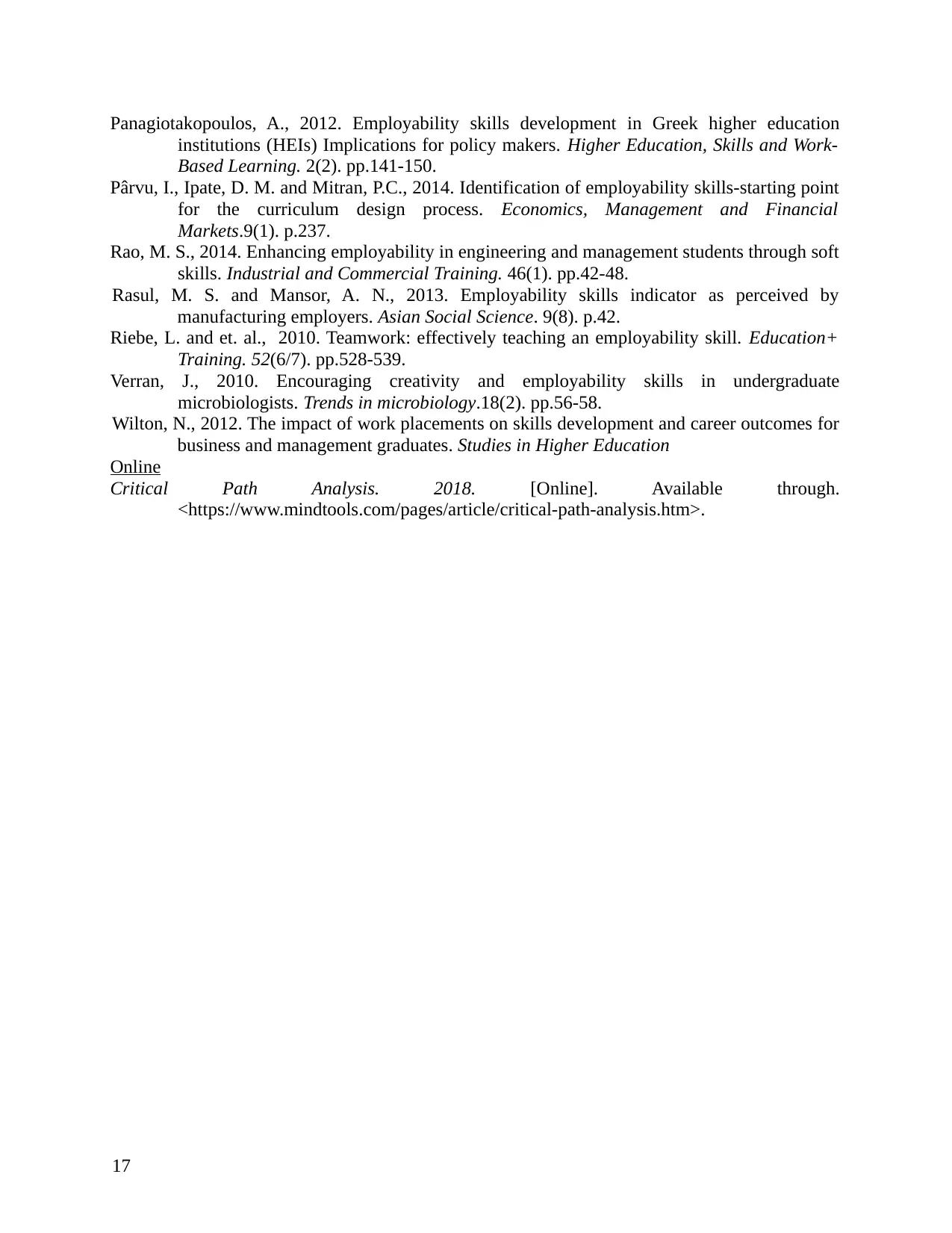
Panagiotakopoulos, A., 2012. Employability skills development in Greek higher education
institutions (HEIs) Implications for policy makers. Higher Education, Skills and Work-
Based Learning. 2(2). pp.141-150.
Pârvu, I., Ipate, D. M. and Mitran, P.C., 2014. Identification of employability skills-starting point
for the curriculum design process. Economics, Management and Financial
Markets.9(1). p.237.
Rao, M. S., 2014. Enhancing employability in engineering and management students through soft
skills. Industrial and Commercial Training. 46(1). pp.42-48.
Rasul, M. S. and Mansor, A. N., 2013. Employability skills indicator as perceived by
manufacturing employers. Asian Social Science. 9(8). p.42.
Riebe, L. and et. al., 2010. Teamwork: effectively teaching an employability skill. Education+
Training. 52(6/7). pp.528-539.
Verran, J., 2010. Encouraging creativity and employability skills in undergraduate
microbiologists. Trends in microbiology.18(2). pp.56-58.
Wilton, N., 2012. The impact of work placements on skills development and career outcomes for
business and management graduates. Studies in Higher Education
Online
Critical Path Analysis. 2018. [Online]. Available through.
<https://www.mindtools.com/pages/article/critical-path-analysis.htm>.
17
institutions (HEIs) Implications for policy makers. Higher Education, Skills and Work-
Based Learning. 2(2). pp.141-150.
Pârvu, I., Ipate, D. M. and Mitran, P.C., 2014. Identification of employability skills-starting point
for the curriculum design process. Economics, Management and Financial
Markets.9(1). p.237.
Rao, M. S., 2014. Enhancing employability in engineering and management students through soft
skills. Industrial and Commercial Training. 46(1). pp.42-48.
Rasul, M. S. and Mansor, A. N., 2013. Employability skills indicator as perceived by
manufacturing employers. Asian Social Science. 9(8). p.42.
Riebe, L. and et. al., 2010. Teamwork: effectively teaching an employability skill. Education+
Training. 52(6/7). pp.528-539.
Verran, J., 2010. Encouraging creativity and employability skills in undergraduate
microbiologists. Trends in microbiology.18(2). pp.56-58.
Wilton, N., 2012. The impact of work placements on skills development and career outcomes for
business and management graduates. Studies in Higher Education
Online
Critical Path Analysis. 2018. [Online]. Available through.
<https://www.mindtools.com/pages/article/critical-path-analysis.htm>.
17
1 out of 17
Related Documents
Your All-in-One AI-Powered Toolkit for Academic Success.
+13062052269
info@desklib.com
Available 24*7 on WhatsApp / Email
![[object Object]](/_next/static/media/star-bottom.7253800d.svg)
Unlock your academic potential
© 2024 | Zucol Services PVT LTD | All rights reserved.





